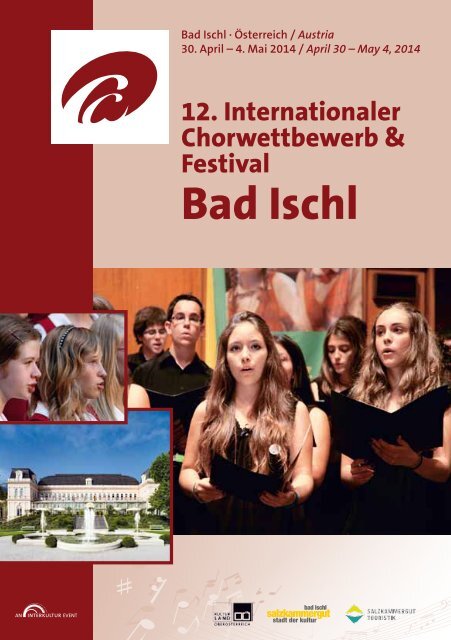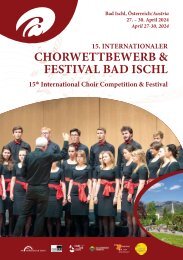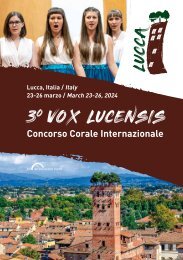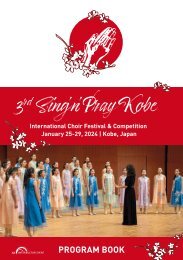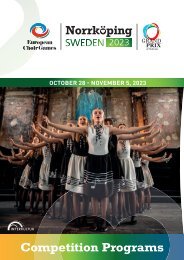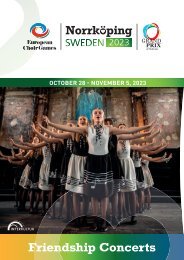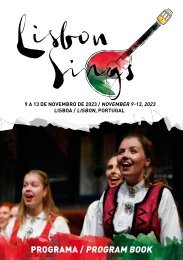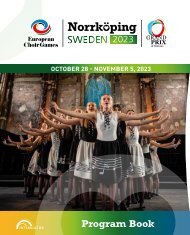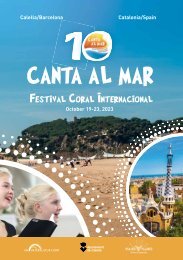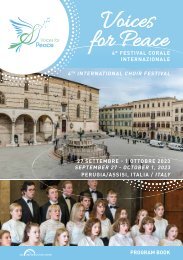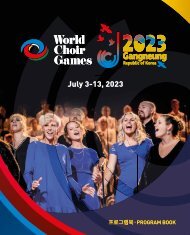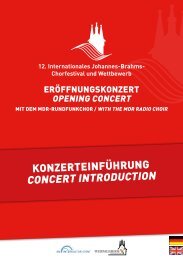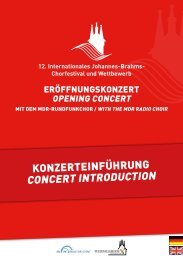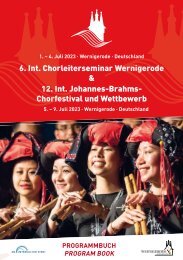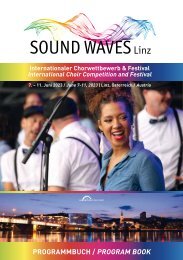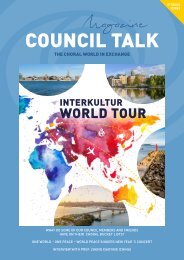Program Book - Bad Ischl 2014
The Program Book of the International Choir Competition & Festival Bad Ischl, Austria from April 30 to May 4, 2014.
The Program Book of the International Choir Competition & Festival Bad Ischl, Austria
from April 30 to May 4, 2014.
You also want an ePaper? Increase the reach of your titles
YUMPU automatically turns print PDFs into web optimized ePapers that Google loves.
<strong>Bad</strong> <strong>Ischl</strong> · Österreich / Austria<br />
30. April – 4. Mai <strong>2014</strong> / April 30 – May 4, <strong>2014</strong><br />
12. Internationaler<br />
Chorwettbewerb &<br />
Festival<br />
<strong>Bad</strong> <strong>Ischl</strong>
2<br />
SING<br />
ALONG!
3<br />
12. Internationaler Chorwettbewerb<br />
& Festival <strong>Bad</strong> <strong>Ischl</strong><br />
12 th International Choir Competition & Festival <strong>Bad</strong> <strong>Ischl</strong><br />
30. April – 4. Mai <strong>2014</strong>, <strong>Bad</strong> <strong>Ischl</strong>, Österreich<br />
April 30 – May 4, <strong>2014</strong>, <strong>Bad</strong> <strong>Ischl</strong>, Austria<br />
Veranstalter / Organiser<br />
Förderverein INTERKULTUR Österreich<br />
in Kooperation mit / in cooperation with<br />
Stadt <strong>Bad</strong> <strong>Ischl</strong><br />
Land Oberösterreich – Kulturdirektion / Upper Austria – Cultural directorate<br />
Salzkammergut Touristik GmbH<br />
Ehrenschutz / Patronage<br />
Dr. Josef Pühringer – Landeshauptmann / Governor<br />
Hannes Heide – Bürgermeister, Kulturstadtrat <strong>Bad</strong> <strong>Ischl</strong> / Mayor, Cultural Council <strong>Bad</strong> <strong>Ischl</strong><br />
Präsident Interkultur / President Interkultur<br />
Günter Titsch (Deutschland/Germany)<br />
Künstlerisches Komitee / Artistic Committee<br />
Prof. Dr. Ralf Eisenbeiß (Deutschland/Germany)<br />
Christian Ljunggren (Schweden/Sweden)<br />
INTERKULTUR Board<br />
Günter Titsch (Deutschland/Germany)<br />
Wang Qin (China)<br />
Stefan Bohländer (Deutschland/Germany)<br />
Prof. Dr. Ralf Eisenbeiß (Deutschland/Germany)
5<br />
Inhaltsverzeichnis /<br />
Table of contents<br />
Seite / Page<br />
Veranstalter / Organizer 3<br />
Inhaltsverzeichnis / Table of contents 5<br />
Teilnehmerländer / Participating countries 6<br />
Grußworte / Greetings 8<br />
• Günter Titsch, Präsident INTERKULTUR / President INTERKULTUR<br />
• Dr. Josef Pühringer, Landeshauptmann / Governor<br />
• Hannes Heide, Bürgermeister / Mayor<br />
Förderverein INTERKULTUR / About INTERKULTUR 16<br />
• … Brücken der Begegnung / … Connecting Bridges<br />
• Statistik / Statistics<br />
Über <strong>Bad</strong> <strong>Ischl</strong> / About <strong>Bad</strong> <strong>Ischl</strong> 26<br />
Künstlerisches Komitee und Jury / Artistic Committee and Jury 32<br />
• Künstlerische Direktoren / Artistic Directors<br />
• Jury / Jury members<br />
Allgemeiner Ablauf / General Schedule 40<br />
Wettbewerb / Competition 46<br />
• Veranstaltungsorte / Venues<br />
Chöre / Choirs 58<br />
Stadtplan / Downtown Map 72<br />
Impressum & Team / Imprint & Team 74
6<br />
Teilnehmerländer / Participating Countries<br />
Deutschland /<br />
Germany<br />
Norwegen /<br />
Norway<br />
Estland /<br />
Estonia<br />
Österreich /<br />
Austria<br />
Griechenland /<br />
Greece<br />
Russland /<br />
Russia<br />
Italien /<br />
Italy<br />
Schweden /<br />
Sweden<br />
Kroatien /<br />
Croatia<br />
Serbien /<br />
Serbia<br />
Lettland /<br />
Latvia<br />
Tschechische Republik /<br />
Czech Republic<br />
Mexiko /<br />
Mexico<br />
Türkei /<br />
Turkey<br />
Namibia /<br />
Namibia<br />
Ukraine /<br />
Ukraine
GruSSworte<br />
Greetings<br />
9
10<br />
Günter Titsch<br />
Präsident INTERKULTUR /<br />
President INTERKULTUR<br />
Liebe Freunde der Chormusik,<br />
INTERKULTUR freut sich, Ihnen heute ein Festival<br />
präsentieren zu können, das durch die jahrelange<br />
kontinuierliche und engagierte Arbeit der<br />
Kollegen der Salzkammergut Touristik GmbH in<br />
<strong>Bad</strong> <strong>Ischl</strong> bereits internationale Bekanntheit und<br />
Anerkennung erreicht hat. Von nun an soll der<br />
Internationale Chorwettbewerb & Festival <strong>Bad</strong><br />
<strong>Ischl</strong> gemeinsam maßgeblich vom Förderverein<br />
INTERKULTUR Österreich gestaltet werden, der<br />
die inhaltliche und organisatorische Verantwortung<br />
übernehmen wird. Der Wettbewerb, auf<br />
den wir uns sehr freuen, wird zukünftig zweijährig<br />
im Wechsel mit dem Anton-Bruckner-<br />
Chorwettbewerb Linz durchgeführt. Dadurch<br />
können wir Ihnen jährlich eine attraktive internationale<br />
Chorveranstaltung in Oberösterreich<br />
anbieten.<br />
<strong>Bad</strong> <strong>Ischl</strong> ist eine ideale Festivalstadt, voll mit<br />
historischen Bezügen und reich an Geschichten<br />
beispielsweise um das legendäre Kaiserpaar<br />
Sissi und Franz. Aber auch in touristischer<br />
Hinsicht kann diese Region alle Register einer<br />
einzigartigen Landschaft ziehen. Sei es das berühmte<br />
„Weiße Rössel“ am Wolfgangsee oder<br />
die idyllisch zwischen See und Berg gebauten<br />
Häuser von Hallstatt – das Salzkammergut kann<br />
mit touristischen Schätzen aufwarten, die jeder<br />
Chor zusätzlich zu seinen Konzerten genießen<br />
kann.<br />
Schließlich möchte ich mich für die jahrelange<br />
Beratung und vielfältige Unterstützung bedanken,<br />
die uns seit Jahren durch die Landeskulturdirektion<br />
von Oberösterreich zukommt. Gerade<br />
durch dieses Engagement konnte seit dem<br />
Jahr 2000, in dem wir die erste Chorolympiade<br />
durchgeführt haben, die internationale Chormusik<br />
in Oberösterreich maßgeblich gefördert<br />
werden.<br />
Ich wünsche dem Internationalen Chorwettbewerb<br />
& Festival <strong>Bad</strong> <strong>Ischl</strong> weiterhin großen Erfolg<br />
und uns allen großartige Kunst- und Kulturerlebnisse<br />
im schönen Salzkammergut.<br />
Günter Titsch<br />
Präsident INTERKULTUR
11<br />
Dear Friends of Choir Music,<br />
It is a great pleasure for INTERKULTUR today<br />
to present to you a festival that thanks to the<br />
committed work undertaken by our fellow<br />
members of staff at the Salzkammergut Touristik<br />
GmbH in <strong>Bad</strong> <strong>Ischl</strong> has already acquired<br />
considerable international prominence and<br />
recognition. From now on, Förderverein INTER-<br />
KULTUR Austria shall take on a leading role in<br />
the organization of the <strong>Bad</strong> <strong>Ischl</strong> Choir Competition<br />
& Festival by assuming the responsibility<br />
for artistic content and organization. The competition<br />
itself – a highlight we are very much<br />
looking forward to – is now going to take place<br />
every other year, thereby taking turns with the<br />
Anton Bruckner Choir Competition in Linz. This<br />
is how we will be able to present to you one<br />
highly attractive international choir competition<br />
in Upper Austria every year.<br />
<strong>Bad</strong> <strong>Ischl</strong> is an ideal city to host a festival. It is<br />
place full of historic sites and traditions, and<br />
rich in legends such as the ones that have<br />
grown up around Sissi and Franz, Austria’s<br />
most legendary imperial couple. For tourists<br />
coming to this area, the <strong>Bad</strong> <strong>Ischl</strong> region is capable<br />
of drawing on sheer unlimited resources<br />
of magnificent and truly unique landscape<br />
set in breathtaking Alpine scenery. Take, for<br />
example, the famous Weißes Rössl Hotel near<br />
the Wolfgangsee or the picturesque town of<br />
Hallstatt with its houses idyllically set between<br />
lakeshore and mountain tops - and there are<br />
many more treasures to be discovered in the<br />
Salzkammergut and enjoyed by the members<br />
of the choirs in addition to their concerts.<br />
Last but not least, I would like to express my<br />
sincere gratitude to the Landeskulturdirektion<br />
Oberösterreich for the valuable support and<br />
helpful advice they have been giving to us<br />
throughout the last years. It is thanks to their<br />
extraordinary commitment that international<br />
choir music has been given a considerable<br />
boost in Upper Austria since we organized the<br />
first World Choir Games in the year 2000.<br />
I wish that the International Choir Competition<br />
and Festival <strong>Bad</strong> <strong>Ischl</strong> may continue its great<br />
story of success this year and that all of us may<br />
have a fantastic time and experience excellent<br />
artistry and culture in the town of <strong>Bad</strong> <strong>Ischl</strong><br />
and the wonderful Salzkammergut region.<br />
Günter Titsch<br />
President INTERKULTUR
12<br />
Dr. Josef Pühringer<br />
Landeshauptmann /<br />
Governor of Upper Austria<br />
Heuer lädt <strong>Bad</strong> <strong>Ischl</strong> vom 30. April bis zum 4.<br />
Mai bereits zum 12. Mal zum Internationalen<br />
Chorwettbewerb & Festival ins oberösterreichische<br />
Salzkammergut ein. Und auch dieses Jahr<br />
sind zahlreiche ausländische Chöre, wie z. B. aus<br />
Deutschland, Italien, Kroatien, Russland, Estland<br />
oder Mexiko der Einladung gefolgt und zeigen<br />
mit ihrer Teilnahme, dass diese Veranstaltung<br />
absolutes internationales Topniveau vorweist.<br />
Auch die Jury ist international besetzt und betont<br />
somit den weltumspannenden Charakter<br />
des friedlichen und freundschaftlichen "Wettstreits<br />
der Stimmen".<br />
Der Chorwettbewerb & Festival <strong>Bad</strong> <strong>Ischl</strong> ist<br />
somit nicht nur eine Leistungsschau der hervorragenden<br />
heimischen Chöre, sondern auch ein<br />
musikalisches Fenster, das einen interessanten<br />
Ein- bzw. Ausblick in die internationale Chorwelt<br />
ermöglicht. Und er weist somit Oberösterreich<br />
nicht nur als ein erstrangiges Musikland, sondern<br />
auch als einen herzlichen Gastgeber aus.<br />
Es ist auch das besondere, freundliche Flair, das<br />
den Internationalen Chorwettbewerb & Festival<br />
<strong>Bad</strong> <strong>Ischl</strong> seit Anbeginn ausmacht. Es steht zwar<br />
die gesangliche Qualität der einzelnen Chöre<br />
bzw. deren Mitglieder im Mittelpunkt, aber es<br />
sind genauso der respektvolle Umgang mit anderen<br />
Kulturen, sowie das miteinander Er- und<br />
Ausleben eines gemeinsamen Hobbys und die<br />
Begeisterung, die allesamt den hervorragenden<br />
Ruf dieser Veranstaltung ausmachen.<br />
Chöre sind Gemeinschaften, die über das gemeinsame<br />
Singen weit hinausgehen. Sie sind<br />
auch Ort der zwischenmenschlichen Begegnungen<br />
und somit eine Gemeinschaft im besten<br />
sozialen Sinn. Dieser Grundsatz wird in Oberösterreichs<br />
Chören – inzwischen sind es mehr<br />
als eintausend, die rund 28.000 Sängerinnen<br />
und Sängern eine musikalische Heimat sind –<br />
seit vielen Jahren gelebt und ist Basis für deren<br />
musikalischen Erfolg.<br />
Ich gratuliere den Organisatoren – INTERKUL-<br />
TUR, der Stadt <strong>Bad</strong> <strong>Ischl</strong> und der Salzkammergut<br />
Touristik GmbH – zu dieser hervorragenden<br />
Chorveranstaltung, wünsche allen Teilnehmerinnen<br />
und Teilnehmern des Wettbewerbes<br />
viel Erfolg und den Besuchern viel Freude an<br />
diesem Festival.<br />
Dr. Josef Pühringer<br />
Landeshauptmann
13<br />
This year <strong>Bad</strong> <strong>Ischl</strong> is particularly proud to be<br />
the host of its renowned International Choir<br />
Competition & Festival. Taking place in this<br />
wonderful city in the Upper Austrian region<br />
of the Salzkammergut from April 30 to May 4,<br />
<strong>2014</strong>, it is already the twelfth time this event<br />
brings together numerous choirs from Austria<br />
and abroad. The active participation of choirs<br />
from Germany, Italy, Croatia, Russia, Estonia,<br />
Mexico and many other countries that have<br />
accepted our invitation shows that this music<br />
event lives up to highest international standards.<br />
And the fact that the contest is headed<br />
by a jury of international experts is likewise evidence<br />
of the global character and true nature<br />
of this event: Reaching out to the world and<br />
inviting people to gather here to join a peaceful<br />
“competition of voices” that celebrates harmony<br />
and friendship.<br />
The <strong>Bad</strong> <strong>Ischl</strong> Choir Competition & Festival held<br />
in Upper Austria is thus not only a mere competition<br />
and exhibition of our excellent local and<br />
national choirs. This event is, at the same time,<br />
a literal “window of music” that provides highly<br />
interesting insights into the world of choir music<br />
as well as it enables beneficial exchange and<br />
encounter between lovers of music from Austria<br />
and around the globe. Upper Austria is delighted<br />
to be hosting this festival as music has<br />
always been a treasure held in high esteem by<br />
the people here, and it is a great pleasure for us<br />
to invite our guests to experience the cordiality<br />
and hospitality so characteristic of our region.<br />
It is this very special flair and atmosphere<br />
of congenial friendliness found at the International<br />
Choir Competition & Festival in <strong>Bad</strong><br />
<strong>Ischl</strong> that has been there right from the first<br />
event more than a decade ago and that has<br />
become one of its most distinctive hallmarks. It<br />
goes without saying that the artistic, musical<br />
and vocal qualities of the individual choirs and<br />
their members are at the heart of the event;<br />
however, the respectful interaction and encounter<br />
between the representatives of the wide<br />
range of diverse cultures coming together here<br />
to share their enthusiasm for and experience<br />
the performance of their hobby with their<br />
friends and the new friends they meet – this is<br />
what this event stands for as well, and it is the<br />
true essence that has created the outstanding<br />
reputation this event enjoys all over the world.<br />
Choirs are far more than just groups of people<br />
united in and by singing. When their members<br />
meet to sing together, they also create a place<br />
for human interaction and personal encounter<br />
to take place and literally become alive - and<br />
hence bring to life the genuine idea of community<br />
in the best and most valuable sense of<br />
the word. It is this cardinal principle that is the<br />
soul of choir music itself – an idea so joyfully<br />
and successfully shared by the more than one<br />
thousand choirs here in Upper Austria today<br />
and uniting about 28,000 chanters in music for<br />
so many years.<br />
I would like to congratulate the organizers –<br />
INTERKULTUR, the city of <strong>Bad</strong> <strong>Ischl</strong>, and Salzkammergut<br />
Touristik GmbH – on the realization<br />
of this outstanding choir music event, and I<br />
wish good luck to all participants as well as joyful<br />
artistic delight, pleasure and fun to all the<br />
visitors coming here to join this festival.<br />
Josef Pühringer<br />
Governor of Upper Austria
14<br />
Hannes Heide<br />
Bürgermeister <strong>Bad</strong> <strong>Ischl</strong> /<br />
Mayor <strong>Bad</strong> <strong>Ischl</strong><br />
<strong>Bad</strong> <strong>Ischl</strong> als Ort internationaler Begegnung<br />
und Inspiration<br />
Aufgrund seiner Vergangenheit ist die Stadt <strong>Bad</strong><br />
<strong>Ischl</strong> für ein Festival prädestiniert, zu dem Chöre<br />
aus vielen Ländern und Kontinenten zusammenkommen,<br />
um gemeinsam zu singen und einander<br />
zuzuhören. <strong>Bad</strong> <strong>Ischl</strong> war und ist ein Ort der<br />
internationalen Begegnung, der schon immer<br />
Künstlerinnen und Künstler angezogen und inspiriert<br />
hat.<br />
Gerade im Jahr <strong>2014</strong> kommt <strong>Bad</strong> <strong>Ischl</strong> dabei besondere<br />
Bedeutung zu, jährt sich doch am 28.<br />
Juli zum hundertsten Mal mit der Unterzeichnung<br />
des Manifests "An meine Völker" durch<br />
Kaiser Franz Josef in der Kaiservilla jener Tag, an<br />
dem der Erste Weltkrieg mit all seinen Auswirkungen<br />
und Auswüchsen seinen Anfang nahm.<br />
Das Zusammenzukommen, die Begegnung und<br />
das Miteinander im Zeichen der Musik senden<br />
damit im Rahmen des 12. Internationalen Chorwettbewerb<br />
& Festival eine Botschaft des Friedens<br />
aus.<br />
Ich freue mich, dass dieses Festival von der Stadt<br />
<strong>Bad</strong> <strong>Ischl</strong>, der Salzkammergut Touristik GmbH<br />
und der Oberösterreichischen Vokalakademie<br />
erstmals gemeinsam mit INTERKULTUR organisiert<br />
wird. <strong>Bad</strong> <strong>Ischl</strong> kann vor allem eindrucksvolle<br />
und in ihrem Ambiente eindrucksvolle Veranstaltungsorte<br />
anbieten, die dazu beitragen, dass<br />
Mitwirkende und Zuhörerinnen und Zuhörer<br />
unvergessliche Momente erleben können. Interessierte<br />
Chöre haben außerdem die Möglichkeit,<br />
einen Gottesdienst mitzugestalten. Diese Angebote<br />
ermöglichen viele herzliche Begegnungen<br />
der Chöre untereinander und den hautnahen<br />
Kontakt zu den Besuchern der Veranstaltungen.<br />
Ich heiße alle teilnehmenden Chöre aus der<br />
Tschechischen Republik, Deutschland, Estland,<br />
Kroatien, Italien, Lettland, Mexiko, Namibia,<br />
Russland, Schweden, Türkei und der Ukraine sowie<br />
des gastgebenden Österreich auf das herzlichste<br />
in der Stadt <strong>Bad</strong> <strong>Ischl</strong> willkommen und<br />
wünsche Allen wunderbare Begegnungen und<br />
möge der 12. internationale Chorwettbewerb<br />
und das Chorfestival allen Teilnehmerinnen und<br />
Teilnehmern, allen Zuhörerinnen und Zuhörern<br />
Inspiration und unvergessliche Eindrücke ermöglichen.<br />
Hannes Heide, Bürgermeister
15<br />
<strong>Bad</strong> <strong>Ischl</strong> – A Place of International Encounter<br />
and Inspiration<br />
A look at the history of <strong>Bad</strong> <strong>Ischl</strong> shows at a<br />
glance that our town is literally predestined to<br />
host a festival that brings together choirs from<br />
many countries and continents to sing together<br />
and to listen to one another. <strong>Bad</strong> <strong>Ischl</strong> has always<br />
been a place of international encounter,<br />
a place that has been attracting and inspiring<br />
artists over decades and centuries.<br />
In the <strong>Bad</strong> <strong>Ischl</strong> calendar of events <strong>2014</strong> there<br />
is one day, July 28, that stands out in particular.<br />
It marks the 100th anniversary of the signing<br />
of the manifesto "To my peoples" at the Kaiservilla<br />
by Emperor Franz Josef, the day that was<br />
to become the onset of World War I, starting<br />
here and then to run its course with all the farreaching<br />
effects and excesses it brought about<br />
in the years to come.<br />
Hence, the coming together of people as well<br />
as the encounter and joyful interaction with<br />
one another under the banner of music that is<br />
provided by the 12th International Choir Competition<br />
& Festival will be a forceful message of<br />
peace sent out to the world.<br />
I am delighted that this festival organized by<br />
the City of <strong>Bad</strong> <strong>Ischl</strong>, the Salzkammergut Touristik<br />
GmbH and the Oberösterreichische Vokalakademie<br />
is supported by INTERKULTUR as<br />
its co-organizing partner for the first time in<br />
its long history. Above all, it is the impressive<br />
venues in <strong>Bad</strong> <strong>Ischl</strong> with their spectacular atmosphere<br />
that will contribute their share to<br />
making all active participants and audience<br />
member experience truly unforgettable moments.<br />
Choirs interested are also invited to take<br />
an active role in the celebration of a church<br />
service. Such opportunities and offers will enable<br />
many cordial and cheerful encounters of<br />
people to take place: the choirs, their members<br />
and the visitors joining the events close to the<br />
action.<br />
Therefore, I would like to extend a most cordial<br />
welcome to the city of <strong>Bad</strong> <strong>Ischl</strong> to all participating<br />
choirs from Croatia, the Czech Republic, Estonia,<br />
Germany, Italy, Latvia, Mexico, Namibia,<br />
Russia, Sweden, Turkey, the Ukraine as well as<br />
Austria, the host country of this festival. I wish,<br />
to all of you, that you may have wonderful encounters<br />
with people from all over the world<br />
and that the 12th International Choir Competition<br />
and Choir may bring inspiration and unforgettable<br />
impressions to all participants and<br />
their audience from around the globe.<br />
Cordially yours,<br />
Hannes Heide<br />
Mayor of <strong>Bad</strong> <strong>Ischl</strong>
Förderverein INTERKULTUR<br />
About Interkultur<br />
17
18<br />
… Brücken der Begegnung<br />
Mit dem 1. Internationalen Chorwettbewerb Budapest im Jahre 1988 war der Anfang für eine<br />
der größten und erfolgreichsten kulturellen Veranstaltungsreihen in Europa gemacht. Der Name<br />
dieser neuartigen Chorwettbewerbe und Festivals, INTERKULTUR Veranstaltungsreihen, ist mittlerweile<br />
in der ganzen Welt durch das hohe künstlerische und organisatorische Niveau bekannt.<br />
INTERKULTUR ist zu einem Begriff in der Welt der Chorbegeisterten geworden und die weltweite<br />
Gemeinschaft um seine Wettbewerbe wächst.<br />
Organisiert werden diese Veranstaltungen vom gemeinnützigen Förderverein INTERKULTUR e. V.,<br />
dessen bislang größter Erfolg es war, die Olympische Idee auf die Chormusik zu übertragen. Die<br />
Chorolympiade 2000 in Linz (Österreich) war der Beginn einer chorolympischen Bewegung. Ihre<br />
Erfolgsgeschichte setzte sich 2002 in Busan (Korea), 2004 in Bremen fort. Und ab 2006 als World<br />
Choir Games in Xiamen (China), 2008 in Graz (Österreich) und 2010 in Shaoxing (China). Im Juli<br />
2012 fanden die World Choir Games erstmals auf dem amerikanischen Kontinent, in Cincinnati,<br />
Ohio statt. Im Jahr <strong>2014</strong> werden sie nach Riga, Lettland kommen und damit erneut zurück nach<br />
Europa.<br />
Ein weiterer Meilenstein in der Geschichte von INTERKULTUR war die Einführung der Weltmeisterschaft<br />
der Chöre. Die erste Weltmeisterschaft fand 2009 in der Provinz Gyeongnam in Südkorea<br />
statt, im Juli 2011 wurde die Chorweltmeisterschaft der Jugend in Graz (Österreich) ausgetragen.<br />
Graz war im Juli 2013 mit den 1. European Choir Games und dem Songs of Spirit Festival<br />
noch einmal Austragungsort für eine INTERKULTUR-Veranstaltung.<br />
Die Idee<br />
INTERKULTUR ist mittlerweile zum Symbol für eine einzigartige künstlerische Idee geworden.<br />
Sie besteht in einer neuen Auffassung über die Durchführung von Chorwettbewerben: Während<br />
sich bei den verdienstvollen traditionellen Chorwettbewerben nur Chöre vergleichen, die zur internationalen<br />
Spitzenklasse gehören, stehen die INTERKULTUR – Wettbewerbe allen Chören, mit<br />
oder ohne Wettbewerbserfahrung offen. Alle Chöre der Welt können sich im Wettbewerb entsprechend<br />
ihrem Leistungsstand vergleichen. Für das künstlerische Komitee liegen die Schwerpunkte<br />
auf Qualität aber auch auf größter Vielfalt der Chöre in allen Wettbewerben. Diese neue<br />
Art der Wettbewerbsorganisation hat in den letzten Jahrzehnten zahlreiche Nachahmer gefunden.<br />
Mit der Idee der World Choir Games, die alle zwei Jahre stattfinden, hat es INTERKULTUR geschafft<br />
der nationalen und internationalen Chorszene neue Impulse und Perspektiven zu geben.
19<br />
Das pädagogische Konzept<br />
Die INTERKULTUR – Veranstaltungen sind nicht nur Wettbewerbe und internationale Chortreffen,<br />
sondern stehen auch für Kompetenz durch zahlreiche pädagogische Angebote, die für eine<br />
nachhaltige Wirkung bei den teilnehmenden Chören sorgen. So können sich Chöre beispielsweise<br />
in Beratungsrunden vor dem Wettbewerb und in intensiven Gesprächen mit der internationalen<br />
Jury wertvolle Hinweise zu ihrem derzeitigen Leistungsstand geben lassen, fachkundige pädagogische<br />
und künstlerische Hinweise erhalten oder Ratschläge zur Interpretation bekommen.<br />
Weitere exklusive Möglichkeiten, dem eigenen Chorsingen neue Impulse zu verleihen, bestehen<br />
in Proben mit internationalen Chorfachleuten.<br />
Außerdem werden bei vielen INTERKULTUR – Veranstaltungen Fachtagungen, Chorleiterseminare,<br />
Komponistenporträts und Fachvorträge angeboten. Freundschaftskonzerte und gemeinsames<br />
Singen verstärken die große emotionale Wirkung der internationalen Chortreffen des<br />
Fördervereins INTERKULTUR e. V.<br />
Das Qualitätssiegel<br />
Seit über 20 Jahren ist MUSICA MUNDI® das exklusive Qualitätssiegel aller INTERKULTUR – Wettbewerbe.<br />
Seit dem ersten Wettbewerb, den INTERKULTUR 1988 in Budapest veranstaltet hat,<br />
besteht ein Bewertungssystem, das als Basis für alle INTERKULTUR – Wettbewerbe dient. Dieses<br />
System wird regelmäßig überarbeitet und ständig weiter entwickelt. Es garantiert Vergleichbarkeit<br />
zwischen allen Wettbewerben und setzt einen Standard in der Welt der Chormusik.<br />
Die Wettbewerbe<br />
Es gibt verschiedene Kategorien für alle Arten und Stufen der Chöre in verschiedenen Schwierigkeitsgraden,<br />
mit und ohne Pflichtstück. Sie bieten eine einzigartige Atmosphäre, gute Wettbewerbsbedingungen,<br />
intensive künstlerische Kontakte, unterschiedliche Beratungsprogramme<br />
und Workshops, sowie Praxis mit internationalen Künstlern. Mehr als 200 Experten und führende<br />
Chordirigenten aus der ganzen Welt gewährleisten ein hohes Maß an Kompetenz in allen<br />
INTERKULTUR-Veranstaltungen.<br />
Das Wertungssystem<br />
Die Jury vergibt Goldene, Silberne und Bronzene Diplome in 10 Stufen bei INTERKULTUR – Wettbewerben<br />
und Bronzene, Silberne oder Goldene Medaillen bei den World Choir Games und den<br />
World Choir Championships nach dem MUSICA MUNDI® Bewertungssystem. In jeder Kategorie<br />
gibt es einen Sieger oder Champion, herausragende Leistungen werden mit besonderen Preisen<br />
geehrt. In manchen Wettbewerben gibt es zusätzliche Wettbewerbe der Kategoriesieger um den<br />
Großpreis, hier wird dann der Gesamtsieger des Wettbewerbs bestimmt.<br />
Die Wettbewerbs- und Festivalorte<br />
Die Veranstaltungen von INTERKULTUR fanden bisher in folgenden Ländern statt: Deutschland,<br />
Indonesien, Israel, Italien, Malaysia, Malta, Österreich, Republik Korea, Spanien, Schweden, Tschechische<br />
Republik, Ungarn, USA, Vietnam und in der Volksrepublik China. Im Herbst <strong>2014</strong> findet<br />
erstmalig eine Veranstaltung in Serbien statt.
20<br />
Die Teilnehmer<br />
Über 7.000 Chöre mit mehr als 300.000 aktiven Sängerinnen und Sängern aus 100 Ländern nahmen<br />
bisher an den INTERKULTUR – Wettbewerben teil. Mehr als die Hälfte der Teilnehmer sind<br />
junge Menschen im Alter bis 25 Jahre.<br />
Die Fördermöglichkeiten<br />
Gemäß seiner Satzung unterstützt der Förderverein INTERKULTUR e.V. folgende Aktivitäten:<br />
Internationale Musikfestivals und Chorwettbewerbe, die das Ziel verfolgen, Chöre aus unterschiedlichen<br />
Regionen der Welt zusammenzubringen und in gegenseitiger Achtung internationale<br />
Zusammenarbeit zu pflegen sowie zum Austausch der Kulturen und der Verständigung<br />
zwischen den Völkern beizutragen;<br />
• Kinder- und Jugendchöre, besonders aus finanzschwachen Ländern;<br />
• Laienchöre aus dem In- und Ausland, die eine intensive und nachhaltige Jugendarbeit<br />
nachweisen können;<br />
• Nachwuchschorleiter, junge Musiker und Sänger (Vergabe von Stipendien);<br />
• zweckgebundene Förderprogramme.<br />
KulturPreis Europa<br />
Der Förderverein Interkultur e.V. wurde im Jahr 2006 mit dem KulturPreis Europa ausgezeichnet,<br />
der vom deutschen Bundesaußenminister a. D. Hans Dietrich Genscher initiiert wurde und vom<br />
KulturForum Europa präsentiert wird. In der Begründung zu dieser Ehrung heißt es, INTERKUL-<br />
TUR gebe den Choren aus aller Welt die Gelegenheit, sich im friedlichen Wettstreit unter dem<br />
Motto „Kultur schafft Toleranz – Frieden stiften mit Kultur“ zu treffen.<br />
… Connecting Bridges<br />
The first INTERKULTUR International Choir Competition in Budapest, held in 1988, was the start of one<br />
of the largest and most successful series of cultural events in Europe. The INTERKULTUR Event Series<br />
has meanwhile become known throughout the world for its high artistic and organizational standards<br />
and as a concept for the choirs and choir enthusiasts worldwide. These events are organized by INTER-<br />
KULTUR, a non-profit organization based in Germany.<br />
INTERKULTUR´s biggest success to date was to bring the antique Olympic idea to the choral commu-
21<br />
nity. The Choir Olympics 2000 in Linz, Austria was the beginning of a Choir Olympic movement, with<br />
subsequent events in Busan, Republic of Korea in 2002, and Bremen, Germany in 2004. This success<br />
continued as the “World Choir Games” in Xiamen, China in 2006, Graz, Austria in 2008, Shaoxing,<br />
China in 2010, and Cincinnati, USA in 2012. In <strong>2014</strong>, the World Choir Games will be held in Riga, Latvia.<br />
Another milestone in the history of INTERKULTUR was to establish a World Championship for choirs.<br />
The first World Choir Championships debuted in 2009 in the Province of Gyeongnam, Republic of Korea,<br />
followed by the World Choir Championships for Youth and Young Adults in July 2011 in Graz, Austria.<br />
Graz again was the host city for a INTERKULTUR event, the first European Choir Games and the<br />
“Songs of Spirit Festival” were held in July 2013.<br />
The Idea<br />
INTERKULTUR has become the symbol for a unique artistic idea, consisting of a new interpretation<br />
concerning the execution of choir festivals. In comparison to traditional meritorious choir competitions<br />
that only invite international elite choirs to take part, the INTERKULTUR competitions are open to<br />
all non-professional choirs. Choirs from all over the world, interested in gaining international festival<br />
and competition experience, can compete according to their level of artistic achievement. The Artistic<br />
Committee puts emphasis on the presence of the highest level of choral performers as well as on the<br />
presence of the greatest diversity of choirs in all competitions. This new type of competition has been<br />
copied by numerous organizations in the past two decades. With the idea to organize the World Choir<br />
Games, formerly known as “Choir Olympics” biennially, INTERKULTUR has opened a door to new impulses<br />
and perspectives for the national and international choral movement.<br />
The Pedagogical Concept<br />
INTERKULTUR events are not just competitions and international choir festivals. Choirs are able to receive<br />
feedback from various pedagogical offerings. In evaluation rounds, choirs have the chance to<br />
work with international jury members and gain advice on their current level of achievement, receive<br />
proficient pedagogical and artistic information and obtain suggestions as to how to interpret the chosen<br />
piece. Choirs may also attend workshops and seminars along with participation in Friendship and<br />
Celebration Concerts which allow international choirs to interact with choirs of the host city during<br />
INTERKULTUR events.<br />
The Quality Seal<br />
For more than 20 years, MUSICA MUNDI® has been the exclusive quality seal for all INTERKULTUR<br />
events worldwide. The rating system on which all INTERKULTUR competitions are based upon since the<br />
first event in Budapest in 1988 have been improved continuously. MUSICA MUNDI® ensures comparability<br />
among all events, a smooth organization and has set standards in the world of choral music.
22<br />
The Competitions<br />
There are various categories for all types and levels of choirs in different degrees of difficulty, with or<br />
without compulsory pieces. The competitions offer good competitive conditions, valuable artistic contacts,<br />
various workshops and seminars, as well as practice opportunities with international performers.<br />
More than 200 experts and leading choirmasters from all over the world guarantee a high level of<br />
expertise in all INTERKULTUR events.<br />
Evaluation System<br />
The jury awards Bronze, Silver, and Gold Diplomas on 10 levels at INTERKULTUR competitions along<br />
with Bronze, Silver and Gold Medals at the World Choir Games and World Choir Championships, according<br />
to the MUSICA MUNDI® evaluation system. In each category, a winner or champion is determined<br />
and outstanding achievements are honored with special prizes. In some competitions there is a grand<br />
prize competition of the category winners which determines the overall winner of the competition.<br />
Locations of Festivals and Competitions<br />
To date, INTERKULTUR events have taken place in Austria, Czech Republic, Germany, Hungary, Indonesia,<br />
Israel, Italy, Malaysia, Malta, People’s Republic of China, Republic of Korea, Spain, Sweden, USA and<br />
Vietnam. In fall <strong>2014</strong> a new choral event takes place in Serbia for the first time.<br />
The Participants<br />
In total, more than 7,000 choirs with over 300,000 active singers from 100 countries have taken part in<br />
the INTERKULTUR competitions to date. An interesting note is that more than half of the participants<br />
have been children and youth up to 25 years of age.<br />
Means of Support<br />
In accordance with its statutes, INTERKULTUR supports the following activities:<br />
• International music festivals and choir competitions whose goal is to bring together choirs from different<br />
regions of the world and encourage international collaboration through mutual respect, as well<br />
as to contribute to cultural exchange and understanding among nations<br />
• Children and youth choirs even from financially challenged countries<br />
• Non-professional choirs that focus on the growth of youth development<br />
• Young, talented choirmasters, young musicians and singers through the support of scholarship<br />
awards<br />
• Specific sponsorship opportunities<br />
European Culture Award<br />
INTERKULTUR was awarded the 2006 European Culture Award, by former German Minister of Foreign<br />
Affairs, Hans Dietrich Genscher and presented by KulturForum Europa, for its activities on behalf of<br />
understanding between peoples and furtherance of common European thinking in the field of culture.
24<br />
Statistik / Statistics<br />
Place/Country Year Nations Choirs Gold Silver Bronze<br />
Budapest (H) 2007 21 50 19 26 5<br />
Linz (A) 2007 14 17 16 5 1<br />
Rome (I) 2007 9 18 9 9 2<br />
Wernigerode (D) 2007 17 40 20 11 –<br />
Venice (I) 2007 12 14 10 5 –<br />
In Canto sul Garda (I) 2007 18 37 24 15 1<br />
Malta (M) 2007 14 18 14 10 –<br />
Jakarta (RI) 2007 12 135 41 71 22<br />
Vienna (A) 2007 14 17 16 9 1<br />
Concorso Corale (I) 2008 13 33 25 12 2<br />
Graz (A) 2008 93 441 232 322 46<br />
Venice (I) 2008 17 32 22 16 3<br />
Vienna (A) 2008 17 26 22 15 1<br />
Budapest (H) 2009 14 46 24 21 5<br />
Venice (I) 2009 17 31 27 16 1<br />
Linz (A) 2009 12 21 11 7 3<br />
Rome (I) 2009 7 11 7 5 –<br />
Gyeongnam (ROK) 2009 32 165 53 53 4<br />
Wernigerode (D) 2009 14 25 16 11 1<br />
In Canto sul Garda (I) 2009 20 35 24 25 3<br />
Malta (M) 2009 10 19 18 5 –<br />
Vienna (A) 2009 11 18 17 9 –<br />
Concorso Corale (I) 2010 13 38 24 16 4<br />
Venice (I) 2010 14 20 19 9 –<br />
Kuala Lumpur (I) 2010 6 13 8 4 –<br />
Shaoxing (PRC) 2010 83 472 140 250 60<br />
Zwickau (D) 2010 7 22 14 7 –<br />
St Louis (USA) 2010 7 17 10 4 –<br />
Vienna (A) 2010 15 16 15 7 –<br />
H ộ i An (VN) 2011 8 31 17 18 3
25<br />
Place/Country Year Nations Choirs Gold Silver Bronze<br />
Budapest (H) 2011 11 52 29 19 5<br />
Venice (I) 2011 16 24 22 10 –<br />
Reno (USA) 2011 4 19 11 10 _<br />
Linz (A) 2011 14 20 14 10 1<br />
Rome (I) 2011 12 18 11 8 3<br />
Wernigerode (D) 2011 14 42 28 16 2<br />
Graz (A) 2011 40 120 53 52 6<br />
In Canto sul Garda (I) 2011 16 43 30 27 1<br />
Malta (M) 2011 7 15 11 7 –<br />
Concorso Corale (I) 2012 15 38 33 7 1<br />
Venice (I) 2012 19 37 37 11 –<br />
Vienna (A) 2012 17 33 26 17 5<br />
Cincinnati (USA) 2012 64 362 149 224 43<br />
Calella (E) 2012 28 70 35 46 3<br />
Guangzhou (PRC) 2012 43 164 47 63 11<br />
Huê´ (VN) 2012 5 19 16 9 –<br />
Budapest (H) 2013 20 62 38 30 4<br />
Venedig (I) 2013 17 26 32 4 –<br />
Linz (A) 2013 14 22 23 7 1<br />
H ộ i An (VN) 2013 7 15 12 6 –<br />
Rome (I) 2013 14 21 19 11 –<br />
Graz (A) 2013 35 72 39 34 6<br />
Wernigerode (D) 2013 18 44 29 18 3<br />
Toruń (PL) 2013 8 16 13 9 –<br />
In...Canto Sul Garda (I) 2013 18 36 24 22 4<br />
Manado (RI) 2013 10 140 75 100 10<br />
Calella/Barcelona (E) 2013 19 41 29 20 4<br />
Malta (M) 2013 18 33 22 19 –<br />
Louisville (USA) 2013 2 18 10 8 1<br />
Manila (RP) 2013 3 45 36 23 1<br />
Málaga (E) <strong>2014</strong> 12 16 8 13 1
Über <strong>Bad</strong> <strong>Ischl</strong><br />
About <strong>Bad</strong> <strong>Ischl</strong><br />
27
28<br />
Über <strong>Bad</strong> <strong>Ischl</strong> / About <strong>Bad</strong> <strong>Ischl</strong><br />
Den zeitlosen Reiz gleich wie das Wesen der Sommerfrische kann man nirgendwo besser erkunden<br />
als hier - wo die Sommerfrische in der Mitte des 19. Jahrhunderts entstand und bis heute erfolgreich<br />
weiterentwickelt wurde. Die Sommerresidenz von Kaiser Franz Joseph hat erkennbar Spuren hinterlassen:<br />
Von der Trinkhalle über das ehemalige Kurhaus bis zum heutigen Museum der Stadt wo<br />
sich der junge Kaiser mit Sissi, der späteren Kaiserin Elisabeth von Österreich und Ungarn verlobte.<br />
Authentische Einblicke in diese Epoche bieten u.a. die Kaiservilla im gleichnamigen Park oder die<br />
ehemalige k.u.k. Hofzuckerbäckerei Zauner.<br />
Geschichte<br />
Die Eröffnung der ersten „<strong>Bad</strong>estube“ 1823 ebnete den Aufstieg <strong>Ischl</strong>s zum führenden Kurort in Europa.<br />
Erzherzogin Sophie von Bayern ließ sich in <strong>Ischl</strong> mit Sole-Kuren gegen Unfruchtbarkeit behandeln<br />
und brachte anschließend die vier „Salzprinzen“ zur Welt - als ersten den späteren Kaiser Franz<br />
Joseph. Dieser verlobte sich 1853 im heutigen Museum der Stadt mit der 16-jährigen bayerischen<br />
Herzogin Sissi. Als Hochzeitsgeschenk für ihren ersten Sohn ließ Erzherzogin Sophie von Bayern die<br />
Kaiservilla bauen, 66 Jahre Sommerresidenz der kaiserlichen Familie und jener Ort, an dem 1914 mit<br />
der Unterzeichnung des „Manifests an meine Völker“ der erste Weltkrieg ausgelöst wurde. Franz<br />
Lehár lebte und komponierte in <strong>Bad</strong> <strong>Ischl</strong>, das Lehár Festival gilt als führend in ganz Europa. Johann<br />
Nestroy arbeitete ebenfalls hier in seiner eigenen Villa, genauso wie Anton Bruckner.<br />
Klima<br />
Für ein angenehmes Urlaubsklima sorgt u.a. die nebelfreie Lage auf 468 Meter Seehöhe mit subalpinem<br />
Heilklima auf einer Fläche von 163 km², davon sind 72 % bewaldet. Immerhin wurde vor 200<br />
Jahren <strong>Ischl</strong>er Luft in Glasgefäßen exportiert und in europäischen Adelshäusern zur „Luftverbesserung“<br />
eingesetzt.
29<br />
Tourismus<br />
Was der Habsburger Herrscher-Familie genehm war, ist für die Gäste der Kaiserstadt bis heute ein<br />
Garant für einen erfolgreichen Urlaub: Saubere Gebirgsluft, mildes Reizklima auf 468 m Seehöhe,<br />
das EurothermenResort <strong>Bad</strong> <strong>Ischl</strong> mit seinen vielseitigen Anwendungen auf Sole-Basis sowie eine<br />
Infrastruktur auf der Höhe der Zeit mit einem Kulturangebot, gefragt weit über <strong>Bad</strong> <strong>Ischl</strong> hinaus. Für<br />
Ausflüge in die Umgebung ist <strong>Bad</strong> <strong>Ischl</strong> ein idealer Ausgangspunkt - Attraktionen wie das Weltkulturerbe<br />
Hallstatt, St. Wolfgang am gleichnamigen See, das Handwerkshaus in <strong>Bad</strong> Goisern oder die<br />
Porzellan-Stadt Gmunden sind nur wenige Autominuten entfernt. Ebenso lohnenswert: Eine Erkundung<br />
der österreichischen Romantikstraße mit ihren 18 Stationen zwischen Salzburg und Wien oder<br />
der Besuch eines der 15 Mitglieder der Gruppe „Kleine Historische Städte“.<br />
***<br />
When setting out for the timeless charms and the true nature of a veritable summer health resort –<br />
<strong>Bad</strong> <strong>Ischl</strong> is the town to go to, the place where the genuine idea of the summer health resort was born<br />
in the mid-nineteenth century and has been developed further and to great success to this present day.<br />
What started as a summer residence commissioned by Emperor Franz Joseph I, has left its impressive<br />
marks and traces all over town: The Trinkhalle building (pump room of the original spa), the former<br />
Kurhaus (spa house), and the site of today’s <strong>Bad</strong> <strong>Ischl</strong> Town Museum, where the young Emperor got<br />
engaged to Elisabeth (called Sissi), the later Empress of Austria and Queen of Hungary. For authentic<br />
insights into this era, come and visit some of these fascinating places like the Kaiservilla located inside<br />
a park of the same name or the Zauner confectionary, purveyor to the former imperial household.<br />
History<br />
The opening of the first “<strong>Bad</strong>estube“ (public bath) in 1823 paved the way for the rise of <strong>Bad</strong> <strong>Ischl</strong> to<br />
become the leading spa in Europe. Archduchess Sophie of Bavaria visited <strong>Ischl</strong> several times to receive<br />
brine cures to treat her infertility, eventually resulting in her giving birth to the four ”Salt Princes“.
30<br />
The eldest of her children, Franz Joseph, who later became Emperor of Austria, got engaged to sixteenyear-old<br />
Duchess Elisabeth in Bavaria (called “Sissi”), in 1853, using as location for the engagement<br />
ceremony a prestigious building in <strong>Ischl</strong> that today houses the <strong>Bad</strong> <strong>Ischl</strong> Town Museum. As a wedding<br />
gift for her first-born son, Archduchess Sophie of Bavaria had the Kaiservilla built, which continued<br />
to serve as the summer residence for the imperial family for a total of 66 years to come. In 1914 this<br />
place was chosen for the signing of the manifesto “To my peoples”, the declaration that was to mark<br />
the unleashing of World War I. Among the famous persons who came to live and work in this town,<br />
there were Franz Lehár, the composer and name giver of the continentally acclaimed Lehár Festival in<br />
<strong>Bad</strong> <strong>Ischl</strong>, Johann Nestroy, singer, actor and playwright, who also worked here at his own mansion, and<br />
composer Anton Bruckner.<br />
Climate<br />
The town’s geographical position on 468 meters above sea level provides for healthy subalpine climate<br />
conditions without fog, which makes <strong>Bad</strong> <strong>Ischl</strong> an ideal holiday resort that spreads on a total area of<br />
163 square kilometres of which 72 % are forested. About 200 years ago, the air of this region was in<br />
fact even commercially captured in glass vessels and exported to numerous houses of European aristocrats<br />
where it was used as “air improver”.<br />
Tourism<br />
What used to be agreeable for the royal family of the Habsburgs may only be considered a proven<br />
recipe for the visitors still coming to the imperial town to this today to spend a pleasant vacation time:<br />
Clean mountain air, mild bracing climate on 468 meters above sea level, the <strong>Bad</strong> <strong>Ischl</strong> Thermal Spa<br />
resort with its wide range of brine (bath) applications, as well as the state-of-the-art infrastructure of<br />
a modern town that offers an abundance of cultural highlights and attracts visitors from all over the<br />
region. The city itself is a perfect starting point for trips to fascinating tourist attractions nearby: The<br />
World Cultural Heritage site of Hallstatt, the town of St. Wolfgang on the waterfront of the lake of the<br />
same name, the Handwerkshaus (guildhall) in <strong>Bad</strong> Goisern, and the town of Gmunden, world-famous<br />
for its long history in the manufacture of precious chinaware and porcelain – to mention only some<br />
of the attractions that are only a few minutes by car from <strong>Bad</strong> <strong>Ischl</strong>. And similarly worthwhile: The<br />
Austrian Romantic Road that stretches from Salzburg in the West to Vienna in the East of Austria and<br />
offers 18 fascinating places to stop by, as well the group of 15 towns known as “Little Historical Towns”.
31<br />
Salzkammergut Touristik GmbH<br />
„Das ganze Land aus einer Hand mit den Experten der Salzkammergut Touristik GmbH“<br />
Salzkammergut Touristik GmbH (gegründet 1994) mit Firmensitz in <strong>Bad</strong> <strong>Ischl</strong> ist der führende Incoming<br />
Spezialist mit vielen Angeboten quer durch ganz Österreich und dem Schwerpunkt Salzkammergut/Salzburger<br />
Land. Jedes Angebot für Gruppenreisende, Einzelkunden oder Vereine wird<br />
individuell nach Ihren Wünschen zusammengestellt.<br />
• Weil unsere Leidenschaft dem Heimatland Österreich gilt.<br />
• Weil wir hier zu Hause sind und den Standortvorteil nutzen<br />
• Weil wir das einzige Incoming Reisebüro sind, das Ihnen Österreich mit dem Schwerpunkt<br />
Salzkammergut anbietet<br />
***<br />
“The entire country from a single source with the experts from the Salzkammergut Touristik GmbH”<br />
The Salzkammergut Touristik GmbH (founded 1994) with head office in <strong>Bad</strong> <strong>Ischl</strong> is the leading incoming<br />
travel agency in the Salzkammergut area with many touristic offers around Austria and a focus<br />
on the Salzkammergut region. Each offer for groups or individual customers is a tailor made program<br />
according to the client’s wishes and needs.<br />
• Because our passion is Austria.<br />
• Because we live here and use the advantage of location<br />
• Because we are the only incoming travel agency, which will offer whole Austria with the focus<br />
Salzkammergut.<br />
Kontakt / Contact:<br />
A-4820 <strong>Bad</strong> <strong>Ischl</strong><br />
Götzstraße 12<br />
Telefon / Phone:<br />
+43 (0)6132/24 000-0<br />
www.salzkammergut.co.at
Künstlerisches Komitee und Jury<br />
Artistic Committee and Jury<br />
33
34<br />
Deutschland / Germany<br />
Ralf Eisenbeiß<br />
Künstlerischer Direktor /<br />
Artistic Director INTERKULTUR<br />
Ralf Eisenbeiß wurde 1952 in Zeulenroda geboren.<br />
Nach dem Abitur studierte er an der Pädagogischen<br />
Hochschule Zwickau Pädagogik, Germanistik<br />
und Musikerziehung. Er promovierte<br />
1979 zum Dr. phil. Von 1978-1981 studierte er<br />
an der Musikhochschule “Franz Liszt” in Weimar<br />
Chor- und Orchesterdirigieren.<br />
Als Inhaber des Lehrstuhles Chorleitung und<br />
Chorgesang an der Pädagogischen Hochschule<br />
in Zwickau wurde Ralf Eisenbeiß 1987 zum Professor<br />
berufen. Er war Leiter des Chores dieser<br />
Einrichtung, der im In- und Ausland bekannt<br />
war und bei nationalen und internationalen<br />
Wettbewerben zahlreiche Preise gewann. Neben<br />
einem umfangreichen Repertoire an a cappella-Literatur<br />
verschiedenster Jahrhunderte<br />
standen auch chorsinfonische Werke auf dem<br />
<strong>Program</strong>m.<br />
Ralf Eisenbeiß war Dozent beim Zentralen<br />
Chorleiterseminar in Berlin und leitete selbst<br />
zahlreiche Seminare. Er ist häufig Gastdirigent<br />
im In- und Ausland.<br />
Seit mehr als 20 Jahren ist er künstlerischer Direktor<br />
für INTERKULTUR. Er gründete den Int.<br />
Robert-Schumann-Chorwettbewerb in Zwickau<br />
und ist Mitbegründer der World Choir Games.<br />
Bisher war er künstlerisch in der Verantwortung<br />
für etwa 100 internationale Wettbewerbe in<br />
Deutschland, Italien, Korea, Indonesien, China,<br />
Österreich, Spanien, den USA und anderen Ländern.<br />
Ralf Eisenbeiß wurde sehr oft als Juror von<br />
nationalen und internationalen Chorwettbewerben<br />
in der ganzen Welt eingeladen.<br />
Ralf Eisenbeiß was born in 1952 in Zeulenroda.<br />
After his secondary school examination he studied<br />
pedagogy, German philology and musical<br />
education. He received his PhD in 1979 at the<br />
Pedagogical University of Zwickau. From 1978 to<br />
1981, he studied choir and orchestra conducting<br />
at the Franz Liszt Conservatory in Weimar.<br />
Ralf Eisenbeiß was working as the director of the<br />
choral department at the Pedagogical University<br />
in Zwickau and appointed professor for choir<br />
conducting and choral singing in 1987. He was<br />
conductor of the renowned Pedagogical University<br />
Zwickau Choir. With his choir he performed<br />
a wide repertoire of compositions for a cappella<br />
choirs and with orchestra too. Under his direction<br />
the choir won numerous prizes at national<br />
and international choir competitions.<br />
Ralf Eisenbeiß was lecturer at the central seminar<br />
for choral conductors in Berlin and organised<br />
numerous workshops himself. He often appears<br />
as guest conductor at home and abroad.<br />
Since more than 20 years he works as artistic director<br />
of INTERKULTUR. Ralf Eisenbeiß is founder<br />
of the Int. Robert Schumann Choir Competition<br />
in Zwickau and one of the founders of the World<br />
Choir Games. Since 1992 he was responsible for<br />
about hundred international competitions of IN-<br />
TERKULTUR in Germany, Italy, Korea, Indonesia,<br />
China, Austria, Spain, USA and other countries.<br />
Ralf Eisenbeiß was very often invited as a juror in<br />
national and other international choir competitions<br />
all over the world.
35<br />
Norwegen / Norway<br />
Margrethe Ek<br />
Jury / Jury Member<br />
Margrethe Ek begann im Alter von 14 Jahren<br />
mit dem Dirigieren und studierte acht Jahre<br />
lang Musik an der Norwegischen Akademie<br />
für Musik. Sie schloss ihr Studium mit einem<br />
Mastertitel in Gesang, einem Chorleiter-Diplom<br />
und einer Zusatztausbildung zum Thema<br />
Musikdarbietung und -präsentation ab.<br />
Sie verfasste sie ein Buch über die positiven<br />
gesundheitlichen Auswirkungen des Chorsingens<br />
(Cantando 2012). Ein Artikel zu den<br />
gesundheitlichen Vorteilen des Chorsingens<br />
wird demnächst in der Zeitschrift der Internationalen<br />
Vereinigung für Chormusik (IFCM)<br />
erscheinen.<br />
Margrethe Ek arbeitet derzeit als Lehrerin an<br />
zwei regionalen Schulen. Zuvor war sie 11 Jahre<br />
lang an der Universität Oslo im Bereich Gesang<br />
und Chorleitung tätig.<br />
Sie leitete mehrere hochkarätige Gruppen verschiedener<br />
Genres – darunter sowohl Chöre als<br />
auch Instrumentalensembles (Sinfonieorchester<br />
und Blaskapellen).<br />
Margrethe Eks verschiedene Ensembles traten<br />
häufig im nationalen Fernsehen und Radio auf<br />
und nahmen mit großem Erfolg an internationalen<br />
Chorwettbewerben teil.<br />
Margrethe Ek hat sich sowohl als Dozentin als<br />
auch als Gastdirigentin in Norwegen einen Namen<br />
gemacht. Sie wird häufig zu nationalen<br />
und internationalen Chorwettbewerben eingeladen,<br />
um dort als Jurorin zu agieren. Margrethe<br />
Ek leitet heute den 2010 gegründeten<br />
Chor Moss Ensemble Consensus.<br />
Margrethe Ek started conducting at the age<br />
of 14 and studied music for eight years, including<br />
master in singing, an education in<br />
music performance and presentation, and a<br />
diploma in conducting from the Norwegian<br />
Academy of Music. She has written a book of<br />
the health benefits of singing in a choir (Cantando<br />
2012). An article of choir and health<br />
benefits are to be published in the bulletin<br />
of international federation of choral music<br />
(IFCM).<br />
Margrethe Ek currently works as a teacher<br />
in music at two local high schools. She has<br />
previously worked at the University of Oslo<br />
within the subjects of song and conduction<br />
for 11 years.<br />
She has conducted several ensembles at high<br />
levels within several genres – both choirs and<br />
instrumental ensembles (symphony orchestras<br />
and wind ensembles). Margrethe Ek’s<br />
different ensembles have often been seen on<br />
national TV and radio, and they have participated<br />
in choir contests at international levels<br />
with great results.<br />
Margrethe Ek has been acknowledged as<br />
both a lecturer and a visiting conductor She<br />
in Norway. She is often invited to be a judge<br />
in both national and international choir contests.<br />
Today Margrethe Ek is the conductor of<br />
Moss Ensemble Consensus, founded in 2010.
36<br />
Österreich / Austria<br />
Fritz Hinterdorfer<br />
Jury / Jury Member<br />
Fritz Hinterdorfer wurde 1936 geboren und ist<br />
künstlerischer Leiter des Chores Chemiepark<br />
Linz, des VHS-Singkreises Freistadt und war<br />
Dirigent des Linzer Kammerorchesters. Er dirigierte<br />
eine Reihe von Chor- und Orchesterwerken,<br />
u.a.: „Orpheus und Euridike“ (Gluck), „Die<br />
Jahreszeiten“ (Haydn), Bruckners „Te Deum“<br />
und „150. Psalm“ sowie Messen von Schubert,<br />
Puccini, Haydn, Mozart und Franz Xaver Brixi.<br />
Außerdem hat er Operaufführungen von Verdi<br />
und Puccini geleitet. Darüber hinaus war er<br />
Gastdirigent beim Savaria-Sinfonie Orchester<br />
(Ungarn) und des Städtischen Symphonieorchesters<br />
in Vaasa (Schweden).<br />
Fritz Hinterdorfer ist Ehrenpräsident der IDO-<br />
CO (Internationale des Organisations culturelles<br />
Ouvrières). Er war einer der Initiatoren der<br />
1. Chorolympiade 2000 in Linz und war bei den<br />
Chorolympiaden in Busan/ Südkorea (2002) in<br />
Bremen/ Deutschland (2004) in Xiamen/China<br />
(2006) Graz (2008) sowie bei Chorwettbewerben<br />
Juror. Hinterdorfer ist im künstlerischen<br />
Komitee und Organisator der Internationalen<br />
Anton- Bruckner- Chorwettbewerbe in Linz. Er<br />
arbeitete im kulturellen Management von Linz<br />
und erhielt dafür zahlreiche Auszeichnungen<br />
der Stadt Linz und dem Land Oberösterreich,<br />
zuletzt vom Bundespräsidenten das „Goldene<br />
Ehrenzeichen für besondere Verdienste um die<br />
Republik Österreich".<br />
Fritz Hinterdorfer was born in Upper Austria<br />
in 1936. He has been conductor of the Chor<br />
Chemiepark Linz choir since 1964. He is also<br />
conductor of the VHS-Singkreis Freistadt and<br />
was conductor of the Linz Chamber Orchestra.<br />
He has conducted several choral and orchestral<br />
parts, including “Orpheus and Euridike“ by<br />
Gluck, “Die Jahreszeiten“ by Haydn, “Te Deum”<br />
and “Psalm 150” by Bruckner and several masses<br />
by Schubert, Puccini, Haydn and Mozart.<br />
Furthermore, he has conducted opera concerts<br />
with compositions of Verdi and Puccini. He was<br />
a guest conductor of the Savaria Symphony Orchestra<br />
in Hungary and of the Symphony Orchestra<br />
of the City of Vaasa in Sweden.<br />
Fritz Hinterdorfer has been president of the<br />
IDOCO (Internationale des Organisations culturelles<br />
Ouvrières) since 1998. He was one of the<br />
initiators and members of the artistic direction<br />
board of the 1 st Choir Olympics in Linz. He later<br />
on served as adjudicator at the Choir Olympics<br />
in Busan, Korea in 2002, Bremen, Germany in<br />
2004, and Xiamen, China in 2006 along with<br />
the Anton-Bruckner Choir Competition in Linz,<br />
Austria. Vocationally, he works in the cultural<br />
management of Linz and has therefore been<br />
awarded several prizes including the “Goldenes<br />
Ehrenzeichen für Verdienste um die Republik<br />
Österreich”, the highest honor one can receive<br />
for meritoriousness of the Republic Austria.
37<br />
Griechenland / Greece<br />
Maria-Emma Meligopoulou<br />
Jury / Jury Member<br />
Maria Emma Meligopoulou hat einen Magisterabschluss<br />
und einen Doktor in Chorleitung<br />
von der Boston und Ionian Universität<br />
und ist Dozentin im Fachbereich Musik an<br />
der Aristo University in Thessaloniki.<br />
Maria Emma Meligopoulou hat an über<br />
1000 Konzerten in Griechenland, Europa<br />
(Österreich, Kroatien, Tschechische Republik,<br />
Deutschland, Finnland, Ungarn, Italien,<br />
Niederlande, Russland, Spanien, Schweiz,<br />
Großbritannien), Asien (Israel, Türkei, Singapur,<br />
China, Japan), Afrika (Ägypten, Südafrika)<br />
und Amerika (USA, Kanada) mitgewirkt.<br />
Als Chorleiterin erhielt sie zahlreiche Auszeichnungen,<br />
unter anderem beim Moscow<br />
Sounds Festival, bei INTERKULTUR Veranstaltungen<br />
und beim Loto Quebec Festival.<br />
Sie ist World Choir Council Mitglied für Griechenland<br />
und eine gefragte Dozentin und<br />
Gastdirigentin bei internationalen Symposien,<br />
Festivals und Workshops.<br />
Maria Emma Meligopoulou ist Autorin der<br />
Bücher „Einführung in die Kunst der Chorpraxis“<br />
(2011) sowie „42 Chorwerke für gleiche<br />
Stimmen von griechischen Komponisten“<br />
(<strong>2014</strong>), beide im Nakas-Papagregoriou<br />
Verlag Athen herausgegeben.<br />
Maria Emma Meligopoulou studierte außerdem<br />
Jura an an der Aristotle Universität in<br />
Thessaloniki, Griechenland und ist eine zugelassene<br />
Rechtsanwältin.<br />
Maria Emma Meligopoulou holds a Master<br />
Degree and a DMA in Choral Conducting<br />
from Boston University & Ionian University<br />
respectfully. She is faculty member at Ionian,<br />
Aristo university choirs.<br />
Maria Emma Meligopoulou has given over<br />
1,000 performances in Greece, Europe (Austria,<br />
Croatia, Czech Republic, Germany, Finland,<br />
Hungary, Italy, Netherlands, Russia,<br />
Spain, Switzerland, UK), Asia (Israel, Turkey,<br />
Singapore, China, Japan), Africa (Egypt, South<br />
Africa), America (USA, Canada).<br />
As choral Director she has been several times<br />
recipient of First Prizes, among them the<br />
Moscow Sounds Festival, Interkultur Festivals,<br />
Loto Quebec Festival (Canada), etc. She<br />
is council member of the World Choir Games<br />
and she is on demand as lecturer and guest<br />
conductor in international symposiums, festivals<br />
and workshops.<br />
She is the author of the books: Introduction<br />
to the Art of Choral Praxis (2011) and 42<br />
Choral Works for Equal Voices by Greek Composers<br />
(<strong>2014</strong>), both available by Nakas- Papagregoriou<br />
Editions, Athens.<br />
Maria Emma Meligopoulou studied Law<br />
at the Aristotle University in Thessaloniki,<br />
Greece and she is a registered Attorney of<br />
Law.
38<br />
Lettland / Latvia<br />
Romāns Vanags<br />
Jury / Jury Member<br />
Romāns Vanags ist Absolvent der Emils-Darzins-<br />
Musikhochschule und der Fakultät für Chor- und<br />
Orchesterdirigieren am lettischen Jazeps Vitols'-<br />
Konservatorium in Riga. Er erhielt sein Diplom<br />
in Chorleitung und Musikpädagogik, außerdem<br />
studierte er Orchesterdirigieren.<br />
2003 erhielt Romāns Vanags seinen Magisterabschluss<br />
in Musik. Seine professionelle Arbeit<br />
ist auf Dirigieren und Pädagogik konzentriert.<br />
Er war lange Zeit Chefdirigent des Lehrerchores<br />
„Vanema” und ist seit 1990 Hauptdirigent<br />
des Frauenchores „Minjona” der Lettischen<br />
Universität. Außerdem war er Chefdirigent und<br />
künstlerischer Leiter des Knabenchores „Jāzeps<br />
Medin‚š Music School” und arbeitete mit dem<br />
Sinfonischen Orchester der Jazeps Medins Musikhochschule<br />
zusammen. Von 1987 bis 1994<br />
war Vanags Professor für Chordirigieren und<br />
Dirigent des Akademiechores an der Lettischen<br />
Musikakademie in Riga. Von 2005 bis 2012 war<br />
er Leiter des Fachbereichs Chorleitung an der<br />
Lettischen Musikakademie.<br />
Romāns Vanags ist einer der Hauptdirigenten<br />
des All Latvian Song Celebration und des Youth<br />
Song Festival. Seit 2004 ist er Vorsitzender der<br />
Lettischen Nationalen Kommission der UNESCO<br />
im Bereich von Lettischen Lied- und Tanzfestivalangelegenheiten<br />
und seit 2008 ist er Mitglied<br />
des World Choir Council. 2008 erhielt Romāns<br />
Vanags die höchte zivile Auszeichung Lettlands.<br />
Romāns Vanags ist einer der künstlerischen Direktoren<br />
der 8. World Choir Games in Riga.<br />
Romāns Vanags is a graduate of Emils Darzins'<br />
specialized music college and of the Department<br />
of Choir and Orchestra Conducting of Jazeps Vitols'<br />
Latvian State Conservatory in Riga. He has received<br />
a diploma in choir conducting and in music pedagogy.<br />
He studied also symphonic orchestra conducting.<br />
In 2003, Vanags received the professional<br />
master's degree in music. His professional work is<br />
focused on conducting and pedagogy. He has been<br />
the Chief Conductor of the teachers' choir "Vanema"<br />
from 1984 – 2004 and since 1990, he has been<br />
the principal Conductor of the Latvian University<br />
female choir "Minjona". Since 1987, he has been<br />
Chief Conductor and Artistic Director of Jāzeps<br />
Medin‚š Music School boys` choir and has worked<br />
with the Jazeps Medins Music College Symphonic<br />
Orchestra from 1990 – 1993. From 1987 thru<br />
1994, Vanags was employed at the Latvian Music<br />
Academy in Riga as professor of choir conducting<br />
and as the conductor of the academy choir. From<br />
2005 to 2012 he was the head of the Conducting<br />
Department.<br />
Vanags has been appointed as one of the chief<br />
conductors of the All Latvian Song Celebration and<br />
the Youth Song Festival. Since 2004, Vanags is the<br />
chairman of the Latvian National Commission<br />
for UNESCO on the Latvian Song and Dance Festival,<br />
and since 2008, he is also a member of the<br />
World Choir Council at INTERKULTUR’S World Choir<br />
Games. In 2008 Romans Vanags received the highest<br />
civil decoration in Latvia – the Three Star Order.<br />
Romāns Vanags is one of the artistic directors of<br />
the 8 th World Choir Games in Riga.
39<br />
Serbien / Serbia<br />
Aleksandar S. Vujić<br />
Jury / Jury Member<br />
Aleksandar S. Vujić hat an der Musikhochschule<br />
Belgrad Klavier, Dirigieren und Komposition<br />
studiert und 1983 sein Studium mit<br />
einem Diplom abgeschlossen. Zwischen 1974<br />
und 2013 war er an derselben Musikhochschule<br />
als Professor tätig.<br />
Aleksandar S. Vujić erhielt 1983 die „Zoltan<br />
Kodaly“ Medaille sowie in 1988 eine Staatsmedaille<br />
aus Israel. <strong>2014</strong> erhielt er eine Auszeichnung<br />
vom serbischen Präsidenten. Er<br />
war 1987 Staatsgast in den USA (USIS).<br />
Im Jahr 1987 gründete Aleksandar S. Vujić<br />
das Kammerorchesters „Sinfonietta“ Beograd,<br />
mit dem er bis heute 12 CDs aufgenommen<br />
hat. Daneben leitete er mehrere Chöre und<br />
Orchester in Serbien und war oft als Juror in<br />
Serbien, verschiedenen europäischen Ländern<br />
und Asien eingeladen.<br />
Mit seinem Chor hat Aleksandar S. Vujić zwei<br />
goldene Medaillen bei INTERKULTUR Veranstaltungen<br />
erworben (World Choir Games<br />
Busan 2002 und Budapest 2009).<br />
Aleksandar S. Vujićs Chorwerke sind in<br />
Deutschland, in den USA, Italien, Ungarn und<br />
Serbien verlegt und werden in vielen Ländern<br />
der Welt gesungen. Der exklusive Verleger von<br />
Vujićs Chorwerken ist der „Synkope“ Verlag –<br />
B. R. Deutschland.<br />
Beim Chorkompositionswettbewerb in Zwickau<br />
(1995) gewann er einen 1. und 3. Preis,<br />
sowie in Trento in 1993 einen 3. Preis.<br />
Aleksandar S. Vujić ist Mitglied des World<br />
Choir Council für Serbien.<br />
Aleksandar S. Vujić studied piano, conducting<br />
and composition at the Music University Belgrad<br />
and graduated in 1983. He was working<br />
as a professor at the same university from<br />
1974 to 2013.<br />
Aleksandar S. Vujić was awarded the “Zoltan<br />
Kodaly“ medal in 1983 and in 1988 a national<br />
medal from Israel. In <strong>2014</strong> he received<br />
an order from the Serbian president and travelled<br />
to the USA in 1987 as a state guest.<br />
In 1987 Aleksandar S. Vujić founded the<br />
chamber orchestra “Sinfonietta” Beograd<br />
which recorded 12 CDs until now. Furthermore<br />
he conducted several choirs and orchestras<br />
in Serbia and was often invited as a juror for<br />
events in Serbia, several European countries<br />
and Asia.<br />
With his choir he achieved two gold medals<br />
at INTERKULTUR events (World Choir Games<br />
Busan 2002 and Budapest 2009).<br />
Aleksandar S. Vujić's choral works have been<br />
edited in Germany, USA, Italy, Hungary and<br />
Serbia and are being sung in many countries<br />
worldwide. “Synkope” – B. R. Germany is the<br />
exclusive publisher of Vujić's choral works.<br />
At the composition competition in Zwickau<br />
(1995) he achieved a 1 st and 3 rd prize and in<br />
Trento 1993 a 3 rd prize.<br />
Aleksandar S. Vujić is a member of the World<br />
Choir Council for Serbia.
Allgemeiner Ablauf<br />
General Schedule<br />
41
42<br />
Allgemeiner Ablauf / General Schedule<br />
Donnerstag, 1. Mai <strong>2014</strong> / Thursday, 1 May <strong>2014</strong><br />
Trinkhalle<br />
16:30 h<br />
Chorparade durch die Innenstadt / Choir Parade through the inner city<br />
Kurpark (Kongress und TheaterHaus)<br />
17:00 h<br />
Eröffnungsveranstaltung / Opening Event<br />
Kongress und TheaterHaus<br />
20:00 h<br />
Eröffnungskonzert / Opening Concert<br />
Freitag, 2. Mai <strong>2014</strong> / Friday, 2 May <strong>2014</strong><br />
Kongress und TheaterHaus<br />
10:00 – 11:00 h<br />
Wettbewerb in Kategorie G – Kinder- und Jugendchöre /<br />
Competition in category G – children’s and youth choirs<br />
11:00 – 11:30 h<br />
Wettbewerb in Kategorie B – Gemischte und Frauenchöre, Schwierigkeitsgrad II /<br />
Competition in category B – mixed and female choirs, difficulty level II<br />
11:45 – 13:00 h<br />
Wettbewerb in Kategorie S – Sakrale Chormusik /<br />
Competition in category S – sacred choir music<br />
Musikpavillon (Kurpark) / Gazebo<br />
15:00 h<br />
Freundschaftskonzert / Friendship Concert<br />
• The Children's Choir of the Kirovograd Musical College "Zorynka", Ukraine<br />
• Rae Kammerkoor, Estland / Estonia<br />
• Regina, Tschechische Republik / Czech Republic
43<br />
Kongress und TheaterHaus<br />
15:00 – 17:20 h<br />
Wettbewerb in Kategorie A – Gemischte, Männer- und Frauenchöre, Schwierigkeitsgrad I /<br />
Competition in category A – mixed, male and female choirs, difficulty level I<br />
17:20 – 17:40 h<br />
Wettbewerb in Kategorie C1 - Gleichstimmige Kammerchöre /<br />
Competition in category C1 – chamber choirs of equal voices<br />
Trinkhalle<br />
18:00 h<br />
Freundschaftskonzert / Friendship Concert<br />
• FMV Ayazağa Isik Schools Choir, Türkei / Turkey<br />
• VokalEnsemble des Otto-Hahn-Gymnasiums Nagold, Deutschland / Germany<br />
• Teranke, Kroatien / Croatia<br />
Stadtpfarrkirche St. Nikolaus<br />
19:00 h<br />
Freundschaftskonzert / Friendship Concert<br />
• Khor Studentov Cherkasskogo Muzykalnogo Uchilishcha, Ukraine<br />
• Collegium Cantorum Rottweil, Deutschland / Germany<br />
• Schola Canticum Novum, Mexiko / Mexico<br />
• Vernalis, Russland / Russia<br />
Trinkhalle<br />
20:00 h<br />
Freundschaftskonzert / Friendship Concert<br />
• Dzvinochky, Ukraine<br />
• WEMSchT Gospelchor, Österreich / Austria<br />
• Youth and Student Choir from Dubna, Russland / Russia<br />
• Stockholms Musikgymnasium Youth Choir <strong>2014</strong>, Schweden / Sweden
44<br />
Samstag, 3. Mai <strong>2014</strong> / Saturday, 3 May <strong>2014</strong><br />
Kongress und TheaterHaus<br />
11:00 – 12:30 h<br />
Wettbewerb in Kategorie F – Folklore / Competition in category F – folklore<br />
12:45 – 13:30 h<br />
Wettbewerb in Kategorie P – Pop, Jazz, Gospel, Spiritual /<br />
Competition in category P – Pop, Jazz, Gospel, Spirituall<br />
19:00 h<br />
Großpreiswettbewerb und Preisverleihung /<br />
Grand Prize Competition and Award Ceremony<br />
anschließend / afterwards:<br />
Chorparty / Choir Party
Wettbewerb<br />
Competition<br />
47
48<br />
Veranstaltungsorte / Venues<br />
Kongress und TheaterHaus<br />
Festivalbüro, Wettbewerbs- und Konzertort /<br />
Festival Office, competition and concert venue<br />
Das Kongress und TheaterHaus <strong>Bad</strong> <strong>Ischl</strong> ist<br />
eines der modernsten Veranstaltungsstätten<br />
der Salzkammergut Region. Es befindet sich im<br />
Herzen der Kaiserstadt, umgeben vom Grün des<br />
Kurparks direkt vor dem spektakulären Gebirgspanorama.<br />
The Kongress & TheaterHaus <strong>Bad</strong> <strong>Ischl</strong> is the<br />
most modern event centre of the Salzkammergut<br />
region. It is situated in the centre of the imperial<br />
town, surrounded by greenery of the Spa-Park, in<br />
front of a spectacular mountain panorama.<br />
Adresse / Address:<br />
Kurhausstrasse 8, 4820 <strong>Bad</strong> <strong>Ischl</strong><br />
Stadtpfarrkirche St. Nikolaus<br />
Freundschaftskonzerte / Friendship concerts<br />
Die Stadtpfarrkirche St. Nikolaus wird überragt<br />
von einem 72 m hohen Turm. Im Inneren fallen<br />
die Fresken, die Altarbilder, die Mosaike, der<br />
geschnitzte Kreuzweg und vor allem die in Österreich<br />
einzigartige "Kaiser-Jubiläums-Orgel"<br />
besonders ins Auge.<br />
The remarkable 72-meter-high spire juts out into<br />
the sky above St. Nikolaus Parish Church. In the<br />
interior of the church there are numerous artistic<br />
treasures that strike the eye, including frescoes ,<br />
altarpieces, a carved version of the stations of the<br />
cross and, above all, the "Kaiser-Jubiläums-Orgel",<br />
a unique masterpiece of an organ nowhere else<br />
to be found in Austria.<br />
Adresse / Address:<br />
Auböckplatz 3, 4820 <strong>Bad</strong> <strong>Ischl</strong>
49<br />
Trinkhalle<br />
Freundschaftskonzerte, Treffpunkt Chorparade /<br />
Friendship concerts, Lineup Choir Parade<br />
Die Trinkhalle wurde ab 1829 von Franz Lössl<br />
als Solebadeanstalt in Form eines griechischen<br />
Tempels mit einem schönen Foyer erbaut und<br />
1831 in Betrieb genommen. Der elegante, großzügige<br />
Innenraum mit fast 80 Metern Länge<br />
diente als Wandelhalle für die Kurgäste, die hier<br />
ihre Trinkkuren absolvierten, und später auch als<br />
Bühne für die Kurmusik. Heute wird die Trinkhalle<br />
als vielseitiges Veranstaltungszentrum<br />
genutzt.<br />
The architectural design of the “Trinkhalle“ is reminiscent<br />
of an ancient Greek temple and was<br />
originally used as a brine bath house. It was<br />
created by Franz Lössl and features, among other<br />
things, a beautiful foyer. Construction work began<br />
in 1829, followed by the opening two years<br />
later. The elegant and spacious interior provides<br />
ample room as it measures almost 80 meters in<br />
length. It consequently served as pump room and<br />
lobby for the guests and patients at the spa that<br />
came here to drink the waters. Later, a stage was<br />
installed for the spa orchestra to entertain the<br />
guests, and today the ”Trinkhalle“ is a treasured<br />
all-round venue for a wide variety of different<br />
concerts and events.<br />
Adresse / Address: Auböckplatz 5, 4820 <strong>Bad</strong> <strong>Ischl</strong>
50<br />
Wettbewerb / Competition<br />
Alle Wettbewerbsauftritte finden im Saal des Kongress & TheaterHauses statt. /<br />
All competition performances take place in the hall of the Kongress & TheaterHaus.<br />
Freitag, 2. Mai <strong>2014</strong> / Friday, 2 May, <strong>2014</strong><br />
10:00 h<br />
Wettbewerb in Kategorie G1 – Kinderchöre<br />
Competition in category G1 – Children‘s Choirs<br />
Freitag / Friday, 2.5.<strong>2014</strong><br />
1 The Children's Choir of the Kirovograd Musical College<br />
"Zorynka"<br />
Kirovograd, Ukraine<br />
Dirigentin / Conductor: Alla Tatarova<br />
<strong>Program</strong>m / <strong>Program</strong>me:<br />
• Trad. Ukraine, arr. Anatoly Avdiyevsky: Oy na lvana, ta y na kupala<br />
• Nicholas Makarov: Angel vopyyashe<br />
• Peter Schindler: Urwald Song<br />
2 Dzvinochky<br />
Ivano-Frankivsk, Ukraine<br />
Dirigentin / Conductor: Bozhena Kutsii<br />
<strong>Program</strong>m / <strong>Program</strong>me:<br />
• Dimitri Bortnyankski: Slava Otsu i Sinu<br />
• Christoph Willibald Gluck: Füllt mit Schalle<br />
• Pawlo Sydko: Ljubit khristavoyu lyubovyu<br />
10:30 h<br />
Wettbewerb in Kategorie G3 – Gemischtstimmige Jugendchöre<br />
Competition in category G3 – youth choirs of mixed voices<br />
1 VokalEnsemble des Otto-Hahn-Gymnasiums Nagold<br />
Nagold, Germany<br />
Dirigent / Conductor: Matthias Wurster<br />
<strong>Program</strong>m / <strong>Program</strong>me:<br />
• Vytautas Miškinis: O salutaris hostia<br />
• Trad. Germany, arr. Oliver Gies: Die Gedanken sind frei<br />
• Moses Hogan: Joshua Fit the Battle of Jericho
51<br />
2 Mješoviti Zbor Glazbene Škole Franje Kuhača Osijek<br />
Osijek, Croatia<br />
Dirigentin / Conductor: Vesna Svalina<br />
<strong>Program</strong>m / <strong>Program</strong>me:<br />
• Claude Debussy: Dieu! qu'il la fait bon regarder<br />
• Igor Kuljerić: Konjičku<br />
• Bob Chilcott: A Little Jazz Mass – Nr. 2 Gloria<br />
11:00 h<br />
Wettbewerb in Kategorie B1 – Gemischte Chöre mit Schwierigkeitsgrad II<br />
Competition in category B1 – mixed choirs with difficulty level II<br />
1 Vernalis<br />
St Petersburg, Russia<br />
Dirigentin / Conductor: Olga Zinoveva<br />
<strong>Program</strong>m / <strong>Program</strong>me:<br />
• Orlando di Lasso: O occhi, manza mia<br />
• Trad. Slovakia, arr. Yuri Yakovlev: Matushka moya<br />
• Trad. Folklore, arr. Jens Klimek: What Shall We Do with the Drunken Sailor<br />
11:15 h<br />
Wettbewerb in Kategorie B3 – Frauenchöre mit Schwierigkeitsgrad II<br />
Competition in category B3 – female choirs with difficulty level II<br />
1 Regina<br />
Vodnany, Czech Republic<br />
Dirigentin / Conductor: Romana Redlova<br />
<strong>Program</strong>m / <strong>Program</strong>me:<br />
• Tielman Susato: Cum decore<br />
• South Bohemian Folk, arr. Jindrich Stanek: Po potoce chodila<br />
• Bohuslav Martinu°: Vynášení smrti<br />
11:45 h<br />
Wettbewerb in Kategorie S – Sakrale Chormusik<br />
Competition in category S – sacred choral music<br />
1 Collegium Cantorum Rottweil<br />
Rottweil, Germany<br />
Dirigent / Conductor: Armin Gaus<br />
<strong>Program</strong>m / <strong>Program</strong>me:<br />
• Josquin des Prés: O bone et dulcis Domine Jesu<br />
• Leonhard Lechner: Magnificat sexti toni<br />
• Armin Gaus: Pange lingua
52<br />
2 Schola Canticum Novum<br />
Guanajuato, Mexico<br />
Dirigent / Conductor: Félix Benjamín Torres Romero<br />
<strong>Program</strong>m / <strong>Program</strong>me:<br />
• Tomás Luis de Victoria: O vos omnes<br />
• Manuel de Sumaya: Salmo 147 – Lauda Jerusalem<br />
• Juan Gutiérrez de Padilla: Stabat mater<br />
Freitag / Friday, 2.5.<strong>2014</strong><br />
3 Dpz Kraški slavček – Krasje<br />
Trieste, Italy<br />
Dirigentin / Conductor: Petra Grassi<br />
<strong>Program</strong>m / <strong>Program</strong>me:<br />
• Georgius Prenner-Pyrenaeus Carniolus: Confitebur tibi Domine<br />
• Felix Mendelssohn Bartholdy: Elias, op. 70 – Hebe Deine Augen auf<br />
• Ivo Antognini: Ave maris stella<br />
4 Youth and Student Choir from Dubna<br />
Dubna, Russia<br />
Dirigentin / Conductor: Elena Khritankova<br />
<strong>Program</strong>m / <strong>Program</strong>me:<br />
• Pavel Tshesnokov: Zastupnitse userdnaya<br />
• Georgi Popov: Gospodi, uslishi<br />
• Pavel Tshesnokov: Khvalite Gospoda s nebes<br />
15:00 h<br />
Wettbewerb in Kategorie A1 – Gemischte Chöre mit Schwierigkeitsgrad I<br />
Competition in category A1 – mixed choirs with difficulty level I<br />
1 Stockholms Musikgymnasium Youth Choir <strong>2014</strong><br />
Stockholm, Sweden<br />
Dirigentin / Conductor: Helene Stureborg<br />
<strong>Program</strong>m / <strong>Program</strong>me:<br />
• Carlo Gesualdo da Venosa: Tristis est anima mea<br />
• György Orbán: Pange lingua<br />
• David Wikander: Förvårskväll (Spring evening)<br />
• Eric Whitacre: With a Lily in Your Hand
53<br />
2 Riga Stradins University Mixed Choir RIGA<br />
Riga, Latvia<br />
Dirigentin / Conductor: Evita Taranda<br />
<strong>Program</strong>m / <strong>Program</strong>me:<br />
• Jāzeps Vītols: Mīlestības dziesma<br />
• Ēriks Ešenvalds: Stars<br />
• Guido López Gavilán: El guayaboso<br />
• Pēteris Vasks: Māte saule<br />
3 Khor Studentov Cherkasskogo Muzykalnogo Uchilishcha<br />
Cherkassy, Ukraine<br />
Dirigentin / Conductor: Natalia Shmaraieva-Gozha<br />
<strong>Program</strong>m / <strong>Program</strong>me:<br />
• Grigori Davydovsky: V moltivakh neusypayushchayu Bogoroditsu<br />
• Anatoly Ushkaryov: Dumy, moi dumy<br />
• Eric Whitacre: Lux aurumque<br />
• Mikhail Glinka: Poputnaya pesnya<br />
4 Namib Youth Choir<br />
Swakopmund, Namibia<br />
Dirigent / Conductor: Sam Shambwa<br />
<strong>Program</strong>m / <strong>Program</strong>me:<br />
• Engelhardt Unaeb: Rise<br />
• Carlos Alberto Pinto Fonseca: Muié Rendêra<br />
• Piotr Jańczak: De profundis clamavi<br />
• Trad. South Africa, arr. Hendrik Hofmeyr: Dubula<br />
Freitag / Friday, 2.5.<strong>2014</strong><br />
16:40 h<br />
Wettbewerb in Kategorie A2 – Männerchöre mit Schwierigkeitsgrad I<br />
Competition in category A2 – male choirs with difficulty level I<br />
1 Stockholms Musikgymnasium Male Choir <strong>2014</strong><br />
Stockholm, Sweden<br />
Dirigentin / Conductor: Helene Stureborg<br />
<strong>Program</strong>m / <strong>Program</strong>me:<br />
• August Södermann: I bröllopsgården (In the wedding mansion)<br />
• Jacobus Galllus: Pueri concinite<br />
• Ola Gjeilo: Ubi caritas<br />
• György Orbán: Daemon irrepit callidus
54<br />
17:00 h<br />
Wettbewerb in Kategorie A3 – Frauenchöre mit Schwierigkeitsgrad I<br />
Competition in category A3 – female choirs with difficulty level I<br />
1 Stockholms Musikgymnasium Female Choir <strong>2014</strong><br />
Stockholm, Sweden<br />
Dirigentin / Conductor: Helene Stureborg<br />
<strong>Program</strong>m / <strong>Program</strong>me:<br />
• Tomás Luis de Victoria: O Regem coeli – Natus est nobis<br />
• Hugo Hammarström: Månsken<br />
• Ola Gjeilo: Prelude<br />
• Jukka Linkola: The Joiku<br />
17:20 h<br />
Wettbewerb in Kategorie C1 – Gleichstimmige Kammerchöre<br />
Competition in category C1 – chamber choirs of equal voices<br />
1 Dpz Kraški slavček – Krasje<br />
Trieste, Italy<br />
Dirigentin / Conductor: Petra Grassi<br />
<strong>Program</strong>m / <strong>Program</strong>me:<br />
• Vytautas Miškinis: Veni veni Emmanuel<br />
• Jacobus Gallus: Pueri hebraeorum<br />
• Rado Simoniti: Balada<br />
• Ambrož Čopi: Dajte Novici Na Kolač<br />
Samstag, 3. Mai <strong>2014</strong> / Saturday, 3 May <strong>2014</strong><br />
11:00 h<br />
Wettbewerb in Kategorie F – Folklore<br />
Competition in category F – folklore<br />
1 Teranke<br />
Pula, Croatia<br />
Dirigent / Conductor: Daniel Dražić<br />
<strong>Program</strong>m / <strong>Program</strong>me:<br />
• Marko Rogošić: Kolo igra kod Svetoga roka<br />
• Ljubo Stipišić Delmata: Žilju moj pribili<br />
• Vinko Lesić: Misečina
55<br />
2 FMV Ayazaǧa Isik Schools Choir<br />
Istanbul, Turkey<br />
Dirigentin / Conductor: Serap Çaldiran Ersoy<br />
<strong>Program</strong>m / <strong>Program</strong>me:<br />
• Trad. Turkey, arr. Ferit Tüzün: Ben giderim batum'a<br />
• Trad. Turkey, arr. Hakan Önsöz: Kizilciklar<br />
• Ender Akay: Dört Kitabin Manasi<br />
• Trad. Turkey, arr. Ahmet Adnan Saygun: Yavuz Geliyor<br />
3 Rae Kammerkoor<br />
Jüri, Harjumaa, Estonia<br />
Dirigentin / Conductor: Alice Pehk<br />
<strong>Program</strong>m / <strong>Program</strong>me:<br />
• Veljo Tormis: Röntyskä<br />
Estonian Folk Dances<br />
Pulmaliste saabumine<br />
Tulesōnad<br />
Lahemaa laul<br />
4 Mješoviti Zbor Glazbene Škole Franje Kuhača Osijek<br />
Osijek, Croatia<br />
Dirigentin / Conductor: Vesna Svalina<br />
<strong>Program</strong>m / <strong>Program</strong>me:<br />
• Emil Cossetto: Dobri denek<br />
• Vinko Žganec: Pjesme iz Med¯imurja<br />
• Dinko Fio: More moje<br />
• Josip Kaplan: Lepo naše ravno polje<br />
Samstag / Saturday, 3.5.<strong>2014</strong><br />
5 Riga Stradins University Mixed Choir RIGA<br />
Riga, Latvia<br />
Dirigentin / Conductor: Evita Taranda<br />
<strong>Program</strong>m / <strong>Program</strong>me:<br />
• Juris Vaivods: Pavasara iezvanīšana (Heralding the spring)<br />
• Jēkabs Graubiņš: Tek saulīte (The setting sun)<br />
• Juris Vaivods: Prūjom, vysi dīdeļnīki! (Off you go, all the cadgers!)
56<br />
Samstag / Saturday, 3.5.<strong>2014</strong><br />
6 Khor Studentov Cherkasskogo Muzykalnogo Uchilishcha<br />
Cherkassy, Ukraine<br />
Dirigentin / Conductor: Natalia Shmaraieva-Gozha<br />
12:45 h<br />
<strong>Program</strong>m / <strong>Program</strong>me:<br />
• Trad. Ukraine, arr. Ivan Zakharzhevskiy: Na kupala, na Ivana<br />
• arr. Yevgen Savtshuk: Da sho na gori Imber<br />
• arr. Oleksandr Bondarenko: Porizala pal'chik<br />
• arr. Anatoliy Avdievskiy: Yak bula ya malenka<br />
Wettbewerb in Kategorie P – Pop, Jazz, Gospel, Spiritual<br />
Competition in category P – Pop, Jazz, Gospel, Spiritual<br />
1 WEMSchT Gospelchor<br />
Wallern/Tr., Austria<br />
Dirigent / Conductor: Richter Grimbeek<br />
<strong>Program</strong>m / <strong>Program</strong>me:<br />
• Trad. Spiritual, arr. Rolla Dilworth: Take me to the Water<br />
• Linda Twain: Sit Down, Servant<br />
• Moses Hogan: I Am His Child<br />
• Keith Hampton: Praise His Holy Name<br />
2 Regina<br />
Vodnany, Czech Republic<br />
Dirigentin / Conductor: Romana Redlova<br />
<strong>Program</strong>m / <strong>Program</strong>me:<br />
• Linda Solomon: The Lion Sleeps Tonight<br />
• Marc Shaiman: Hail Holy Queen<br />
• Trad. Spiritual: Deep River<br />
• Karl Jenkins: Adiemus<br />
3 Coro Voxes<br />
Fossano, Italy<br />
Dirigent / Conductor: Marco Meriggio<br />
<strong>Program</strong>m / <strong>Program</strong>me:<br />
• Adelmo Fornaciari, arr. Andrea Figallo: Di sole e d'azzurro<br />
• Chris Martin, arr. Jens Johansen: Viva la vida<br />
• Andrea Figallo: Changes<br />
• SoVoSo, arr. Jens Johansen: Say
Chöre<br />
Choirs<br />
59
60<br />
Collegium Cantorum Rottweil<br />
Rottweil, Deutschland / Germany<br />
Gegründet / Founded: 1993<br />
Dirigent / Conductor: Armin Gaus<br />
S<br />
VokalEnsemble des Otto-Hahn-Gymnasiums Nagold<br />
Nagold, Deutschland / Germany<br />
Gegründet / Founded: 2009<br />
G3<br />
Dirigent / Conductor: Matthias Wurster
61<br />
Rae Kammerkoor<br />
Jüri, Harjumaa, Estland / Estonia<br />
Gegründet / Founded: 2008<br />
Dirigentin / Conductor: Alice Pehk<br />
F<br />
Coro Voxes<br />
Fossano, Italien / Italy<br />
Gegründet / Founded: 2006<br />
Dirigent / Conductor: Marco Meriggio<br />
P
62<br />
Dpz Kraški slavček – Krasje<br />
Trieste, Italien / Italy<br />
Gegründet / Founded: 1999<br />
C1 / S<br />
Dirigentin / Conductor: Petra Grassi<br />
Mješoviti Zbor Glazbene Škole Franje Kuhača Osijek<br />
Osijek, Kroatien / Croatia<br />
Gegründet / Founded: 1953<br />
F / G3<br />
Dirigentin / Conductor: Vesna Svalina
63<br />
Teranke<br />
Pula, Kroatien / Croatia<br />
Gegründet / Founded: 2002<br />
Dirigent / Conductor: Daniel Dražić<br />
F<br />
Riga Stradins University Mixed Choir RIGA<br />
Riga, Lettland / Latvia<br />
Gegründet / Founded: 1951<br />
A1 / F<br />
Dirigentin / Conductor: Evita Taranda
64<br />
Schola Canticum Novum<br />
Guanajuato, Mexiko / Mexico<br />
Gegründet / Founded: 2005<br />
Dirigent / Conductor: Félix Benjamín Torres Romero<br />
S<br />
Namib Youth Choir<br />
Swakopmund, Namibia / Namibia<br />
Gegründet / Founded: 2012<br />
A1<br />
Dirigent / Conductor: Sam Shambwa
65<br />
WEMSchT Gospelchor<br />
Wallern/Tr., Österreich / Austria<br />
Gegründet / Founded: 2012<br />
Dirigent / Conductor: Richter Grimbeek<br />
P<br />
Vernalis<br />
St. Petersburg, Russland / Russia<br />
Gegründet / Founded: 2008<br />
B1<br />
Dirigentin / Conductor: Olga Zinoveva
66<br />
Youth and Student Choir from Dubna<br />
Dubna, Russland / Russia<br />
Gegründet / Founded: 1994<br />
Dirigentin / Conductor: Elena Khritankova<br />
S<br />
Stockholms Musikgymnasium Female Choir <strong>2014</strong><br />
Stockholm, Schweden / Sweden<br />
Gegründet / Founded: 2008<br />
A3<br />
Dirigentin / Conductor: Helene Stureborg
67<br />
Stockholms Musikgymnasium Male Choir <strong>2014</strong><br />
Stockholm, Schweden / Sweden<br />
Gegründet / Founded: 2008<br />
A2<br />
Dirigentin / Conductor: Helene Stureborg<br />
Stockholms Musikgymnasium Youth Choir <strong>2014</strong><br />
Stockholm, Schweden / Sweden<br />
Gegründet / Founded: 2008<br />
A1<br />
Dirigentin / Conductor: Helene Stureborg
68<br />
Regina<br />
Vodnany, Tschechische Republik / Czech Republic<br />
Gegründet / Founded: 2008<br />
B3 / P<br />
Dirigentin / Conductor: Romana Redlova<br />
FMV AyazaĞa Isik Schools Choir<br />
Istanbul, Türkei / Turkey<br />
Gegründet / Founded: 2001<br />
Dirigentin / Conductor: Serap Çaldiran Ersoy<br />
F
69<br />
Dzvinochky<br />
Ivano-Frankivsk, Ukraine / Ukraine<br />
G1<br />
Dirigentin / Conductor: Bozhena Kutsii<br />
Khor Studentov Cherkasskogo Muzykalnogo Uchilishcha<br />
Cherkassy, Ukraine / Ukraine<br />
Gegründet / Founded: 2010<br />
A1 / F<br />
Dirigentin / Conductor: Natalia Shmaraieva-Gozha
70<br />
The Children's Choir of the Kirovograd Musical College "Zorynka"<br />
Kirovograd, Ukraine / Ukraine<br />
Gegründet / Founded: 2007<br />
G1<br />
Dirigentin / Conductor: Alla Tatarova
72<br />
Stadtplan / Downtown Map
73<br />
Zeichenerklärung<br />
A<br />
B<br />
C<br />
D<br />
E<br />
F<br />
G<br />
H<br />
K<br />
M<br />
N<br />
Photomuseum<br />
Kaiservilla<br />
Parkbad <strong>Bad</strong> <strong>Ischl</strong><br />
Lehár Theater (Kino)<br />
Eurothermen Resort<br />
Lehárvilla<br />
Trinkhalle<br />
Kongress & Theater Haus<br />
Post<br />
Museum der Stadt<br />
Pfarrheim<br />
1 Hotel Royal<br />
2 Hotel Goldenes Schiff<br />
3 Hotel Goldener Ochs<br />
4 Landhotel Hubertushof<br />
5 Hotel Villa Seilern<br />
6 Hotel Stadt Salzburg<br />
7 Hotel Garni Sonnhof<br />
9 Gasthof Sandwirt<br />
13 Pension Haus Osterberger<br />
14 Jugendgästehaus
74<br />
Impressum & Team / Imprint & Team<br />
Team INTERKULTUR<br />
Organisationsbüro / Organisation Office: Jana Bathomene, Julia Hoppe<br />
IT, Ergebnisauswertung / IT, results: Sebastian Ferstl<br />
Abwicklung / Stage Management: Ella Schmiede, Reinhold Schunk<br />
Kontakt / contact<br />
c/o Kongress & TheaterHaus <strong>Bad</strong> <strong>Ischl</strong><br />
Kurhausstrasse 8<br />
4820 <strong>Bad</strong> <strong>Ischl</strong><br />
Österreich<br />
mail@interkultur.com<br />
www.interkultur.com<br />
Impressum<br />
Inhalt / Contents: Ralf Eisenbeiß, Julia Hoppe, Salzkammergut Touristik GmbH<br />
Gestaltung / Design: Ina Irmisch, Appelt Mediendesign GmbH, Werdau<br />
Druck / Print: online Druck GmbH (flyeralarm.at)<br />
Stadtplan / City map: © Salzkammergut Touristik GmbH<br />
Preis / Price: 5,- €<br />
Fotonachweise / Photo Credits:<br />
Titelseite/front page: links/left: © Fotogruppe Gleisdorf | rechts/right: © Tourismusverband <strong>Bad</strong> <strong>Ischl</strong><br />
Grußworte/Greetings: Seite/Page 8/9: © Egon Weissheimer | Seite/Page 10/12/14: Alle Portraits wurden von den<br />
entsprechenden Personen privat oder durch deren Dienststellen zur Verfügung gestellt./All portraits were supplied by<br />
the corresponding people either privately or through their office<br />
Förderverein INTERKULTUR/About INTERKULTUR: Seite/Page 16/17: © Tara Spacy<br />
Über <strong>Bad</strong> <strong>Ischl</strong>/About <strong>Bad</strong> <strong>Ischl</strong>: Seite/Page 26/27: © www.badischl.at | Seite/Page 28: © Tourismusverband <strong>Bad</strong> <strong>Ischl</strong> |<br />
Seite/Page 29: © Tourismusverband <strong>Bad</strong> <strong>Ischl</strong> (links / left), © Wild & Team (rechts/right) |<br />
Seite/Page 30: © Herbert Hutflesz | Seite/Page 31: © Salzkammergut Touristik GmbH<br />
Künstlerisches Komitee und Jury/Artistic Committee and Jury: Seite/Page 32/33: © Egon Weissheimer | Seite/Page 34-39:<br />
Alle Portraits wurden von den entsprechenden Personen privat oder durch deren Dienststellen zur Verfügung gestellt. /<br />
All portraits were supplied by the corresponding people either privately or through their office<br />
Allgemeiner Ablauf/General Schedule: Seite/Page 40/41: © Clifford J. Turrell | Seite/Page 43: © Fotogruppe Gleisdorf |<br />
Seite/Page 44: © Fotogruppe Gleisdorf<br />
Wettbewerb/Competition: Seite/Page 46/47: © Clifford J. Turrell | Seite/Page 48/49: © Tourismusverband <strong>Bad</strong> <strong>Ischl</strong> |<br />
Seite/Page 49: © www.badischl.at (unten / below)<br />
Chöre/Choirs: Seite/Page 58/59: © Anna Bentley | Seite/Page 60-70: Die Chorfotos entstammen aus Privatbeständen<br />
der einzelnen Chöre. Alle Portraits wurden von den entsprechenden Personen privat oder durch deren Dienststellen zur<br />
Verfügung gestellt./The choir photos are from private collections belonging to the choirs themselves. All portraits were<br />
supplied by the corresponding people either privately or through their offices.<br />
Stadtplan/Downtown Map: © Salzkammergut Touristik GmbH<br />
Rückseite/back page: links/left: © Fotogruppe Gleisdorf | rechts/right: © www.badischl.at
12. Internationaler Chorwettbewerb<br />
& Festival <strong>Bad</strong> <strong>Ischl</strong><br />
Ruhberg 1<br />
35463 Fernwald (Frankfurt/Main) Germany<br />
Phone: +49 (0)6404 69749-25<br />
Fax: +49 (0)6404 69749-29<br />
mail@interkultur.com<br />
www.interkultur.com


